|
CHAPTER FOUR: THE MANNER OF DUA |
THINGS TO DO BEFORE DUA
THINGS TO DO ALONG WITH DUA
THINGS TO DO AFTER DUA
MUTUAL CURSING (MUBAHELAH)
EPILOG
|
Things To Do Before Dua |
a- Purification
b- Application
of perfume
c- Being
in the direction of Qiblah
d- Giving
alms
God Almighty says:
* ![]() *
*
-”...Offer something in charity before your consultation.”
(Verse 12 of the Quranic Chapter, the Pleading One)
e- Belief
in God’s power to fulfill his desire as verse 186 of the Quranic Chapter, the
Cow, says:
* ![]() *
*
“and believe in Me.”
It has been reported on the authority of the Holy Prophet (SAW):
* ![]() *
*
366. “Whoever
asks something from Me and is sure that gain and loss are in My hand, I will
fulfill his desire.”
f- Having
good opinion of God that He will answer his call.
Hope in God’s Mercy
God says:
* ![]() *
*
“....call on Him fearing and hoping....”
(Verse 56 of the Quranic Chapter, The Elevated Places)
* ![]() *
*
367. “My
opinion of My servant is his opinion of Me.
Therefore, he should have good opinion of Me.”
The Holy Prophet (SAW) has said:
* ![]() *
*
368. “Call
on God when you are sure of fulfillment of Dua.”
One of the revelations of God to prophet Moses (AS) was:
* ![]() *
*
369. “O
Moses! Should you call on Me hoping, I will soon forgive you.”
Soleyman Ibne Farrah has reported on the authority of Imam Sadeq (AS):
* ![]() *
*
“Whenever you recite Dua, be sure that what you need is at the
door.”
In another Hadith, we read:
* ![]() *
*
370. “Turn
to Him wholeheartedly and be sure that what you need is at the door.”
Why shouldn’t man have good opinion of God when it is He is the
Most Generous One and the Most Merciful and it is He whose Mercy precedes His
wrath.
It has been reported that:
*  *
*
371. “When
God blew in a man from His own spirit and man became human, he sat and sneezed.
He was inspired to say: Praise is due to the Lord of the worlds.
In response, God said: May God have mercy on you O Adam!”
Therefore, the first words of God to Adam was with mercy.
It has been related in a Hadith:
*  *
*
372. “When
God sent prophet Moses (AS) to Pharaoh, He said to Moses: Tell him that I am
more speedy in Mercy and forgiveness than wrath and punishment.”
In another Hadith, we read:
*  *
*
373. “When
Pharaoh was being drowned, instead of invoking God, he invoke Moses (AS).
God inspired him: O Moses! You did not help him since you had not created
him but if he had asked Me for help, I would have helped him.”
Mohammad Ibne Khaled has reported in his book on the authority of the Holy
Prophet (SAW):
374. “When
prophet Jonah (Yunus) reached the sea where Korah (Qarun) was, Korah said to his
guardian angel: What is this sound and fear I hear?
The angel said: This is Jonah whom God has imprisoned in the stomach of
fish and made him go round the seven seas and end up in here.
this sound and fear is for his sake.
Korah
said: do you permit me to speak to him?
The angel said: Yes.
Then Korah (Qarun) said to Jonah (AS): Why don’t you repent to your
Lord?
Jonah said: Why didn’t you yourself repent to your Lord?
Korah said: I repented to Moses (AS) but he did not accept it.
However, if you repent to God, you will receive His Mercy in the first
step you take.
Don’t you see how kindly He treats His servants and how He showers them
with His mercy?”
One of the signs of God’s mercy is that He has encouraged believers to
recite Dua for their brothers in faith saying: Call upon Me with a tongue you
have not committed sin and that is the tongue of others.”
One of the other signs of God’s mercy are those Hadiths which encourage
believers to offer the reward of prayers for the deceased.
God has sent manifold reward for it in a way that it has been reported on
the authority of the Holy Prophet (SAW):
*  *
*
375. “Whoever
enters a cemetery and recites the Quranic Chapter, Yaseen, God will reduce
punishment on the deceased buried in that cemetery on that day and good deeds
will be written for this person, as many as the number of the deceased.”
Imam Sadeq (AS) has said:
*  *
*
376. “The
reward of prayer, fast, Hajj, alms, Dua, and charity after the death of a person
goes to him and its reward is written both for those who perform these deeds and
for the dead person.”
Imam Sadeq (AS) has also said:
*  *
*
377. “Every
muslim who does a good deed on behalf of a dead person, God will give him a
double reward and benefit the dead person.”
The third sign of God’s bountiful mercy is His decree to the Holy
Prophet of Islam (SAW) when He said:
* ![]() *
*
- “So
know that there is no god but Allah, and, ask forgiveness for your fault and for
the believing men and the believing women.”
(Verse 19 of the Quranic Chapter, Muhammad)
Dear
reader ponder on this Quranic verse and see how God has put the decree of
seeking forgiveness alongside monotheism which is the basis of Islam and divine
commandments revolve round this axis.
Is this anything but His bountiful mercy?
God was not content with it either, for somewhere else He says:
* ![]() *
*
“I
am to be found wherever My servant thinks I am.”
* ![]() *
*
“....and
on Allah should you rely if you are believers.”
*  *
*
“....and
they said: Allah is sufficient for us and most excellent is the protector.
So they returned with favor from Allah and (His) grace; no evil touched
them and they followed the pleasure of Allah.....”
(Verse 173-174 of the Quranic Chapter, The Family of Imran)
* ![]() *
*
“Surely
Allah loves those who rely on Him.”
Imam
Sadeq (AS) was asked about the degree of trust.
The Imam (AS) said:
* ![]() *
*
378.
“When he is with God, he no longer fears anything.”
It
has been reported on the authority of Imam Kazeem (AS):
*  *
*
379.
“By God, the reward of this world and Hereafter was not given to any
believer save for:
-His
god opinion of God and his hope in Him
-His
good Temper
-Not
backbiting the believers
God
will punish a man after repentance and forgiveness save for:
-Having
suspicion and lacking hope in God
-Bad
temper
-Backbiting
the believers
*  *
*
-”A
believer never has good opinion of God unless God treats him on the basis of
that good opinion, for, God is Generous and is ashamed of opposing His
servant’s opinion and hope.
Therefore, improve your opinion of God and show eagerness towards Him,
for God Himself in verse of the Quranic Chapter, Fatah, says:
* ![]() *
*
“....the
entertainers of evil thoughts about Allah.
On them is the evil turn, and Allah’s wrath is with them:”
* 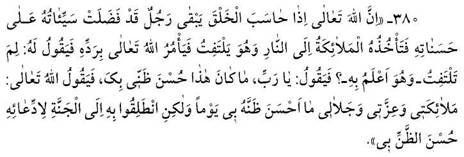 *
*
380.
“When God has reckoned the deeds of people, there remains one person
whose evil deeds surpass his good deeds.
Angels take him to throw into Fire.
While he is looking behind him, God tells the angels to send him back
saying: Why were you looking behind you?
Evidently God knows the reason.
The man says: O God! My good opinion of you was different from this.
At this time, God says: My angels, by My Glory! This man had no good
opinion of Me even for a single day.
Nevertheless take him to paradise, for he claims he has good opinion of
Me.”
* 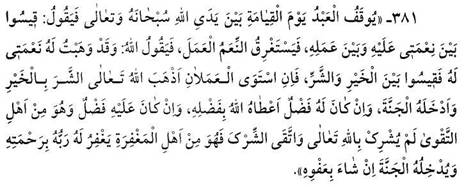 *
*
381.
“On the Day of Judgement, a man is held before God.
Then it is said to angels: Compare My blessings with his deeds.
But the blessings surpass the deeds, and overwhelm them.
Here God says: I granted all My blessings to him.
Compare his good and evil deeds.
At this time if they are equal, God removes evil deeds for the sake of
good deeds and make him enter paradise.
If his good deeds are greater, God forgives him but if his evil deeds are
more but he had been pious and had not set a partner for God, He will forgive
the man and make him one of those entitled to forgiveness and should He will, He
will make him enter paradise due to His forgiveness.”
*  *
*
382.
“God gathers all people on the Day of Judgment while some of them have
rights on others and God has rights on them too.
At this time God says: O my servants! I remit My own rights.
You too remit your rights against one another and enter paradise all
through My mercy.”
*  *
*
383.
“On the Day of Judgment, there is a call from God’s Throne saying; O
nation of Muhammad! I remit all the rights I had against you.
There remains your own rights.
Therefore, remit one another’s right and enter paradise through My
mercy.
384.
“There was a pious man among Bani Israel.
God inspired prophet David (AS) that the pious man was hypocritical.
After sometime the man passed away.
Prophet David did not attend his funeral service but forty men of Bani
Israel did so and said:
O
God! We know nothing but good about him.
Yet You are the All-knowing.
Forgive him his sins.
After bathing the corpse, forty others rose up saying: O God! We know
nothing but good about him.
Yet You are the All-knowing.
Forgive him his sins.
After having buried him, forty others came and said:
O
God! We know nothing but good about him.
Yet You are the All-knowing.
Forgive him his sins.
At
this time God said to David: Why didn’t you pray for him?
David said: You Yourself said he is hypocritical.
God said: Since a group of people testified that he was good, I accepted
their testimony, hence I forgave him for what I knew but they did not know.”
Fear
of God
Hope
should always be accompanied with fear.
In this relation Amiralmomenin (AS) has said:
*  *
*
385.
“Try to have good opinion of God and fear Him at the same time, for
everyone’s good opinion of God is to the extent of his fear of Him.
Therefore Those who have a better opinion of Allah, have more fear of
Him.”
*  *
*
386.
“A servant of Allah does not attain the position of belief unless he is
both hopeful and fearful.
Nor will he become hopeful and fearful unless he acts according to his
fear and hope.”
*  *
*
387.
“They are lying.
They are never our friends.
These are persons whose desires have defeated them, for one who is
hopeful of something, will try to attain it and one who fears something escapes
from it.”
1-
In a Hadith, we read:
388.
The supplication of prophet Ibrahim could be heard from a mile so much so
that God described Ibrahim as follows:
![]() *
*
2-
The same was true with the Holy Prophet of Islam (SAW).
3-
When Amiralmomenin began to perform ablution, he would look pale out of
fear of God.
4-
Hazrate Fatimah used to be excited while praying out of fear of Allah.
Asked
for reason, the Imam said:
* ![]() *
*
389.
“One who wishes to attend the presence of the Lord of the Throne,
should lose color.”
7-
Mafzal Ibne Omar has reported on the authority of Imam Sadeq (AS):
* 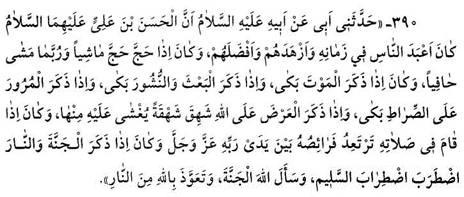 *
*
390.
“Quoting his father, my father has said: Imam Hassan Ibne Ali (AS) was
the most pious, the most devoted and the most learned man of his time.
Whenever he went on Hajj, he would go on foot and on many occasions
bare-footed.
Whenever
he remembered death, he would start crying.
When he remembered resurrection, he would start weeping.
Whenever he remembered Saraat, he would bitterly weep and when he
remembered offering his deeds to God, he would weep loudly and keep silent.
When he stood for praying before God, his two sides started trembling and
whenever he remembered paradise and Hell, he would become excited as a man
bitten by snake.
He wished for paradise and sought refuge with Him from Hell.”
8-
Ayesheh has reported:
The
Holy Prophet (SAW) used to speak to us and we spoke to him but when it was
prayer time, it was as if neither he knew us nor did we know him.
When
those who are close to God as well as His Messengers and the Imams are
overwhelmed with such a fear, what should we who are drowned in wrongdoings do?
g-
One should not ask God for something which is unlawful or severing the
ties of kinship.
h-
One should not ask for something which leads to indecency or impudence.
The
commentators in their interpretation of Verse 55 of the Quranic Chapter, Araf,
* ![]() *
*
“Call
on your Lord humbly and secretly; surely He does not love those who exceed
limits.” have said: Humbly and secretly means invoke God humbly.
Those who exceed the limits are persons who, for instance, ask for the
position of prophets.
Amiralmomenin
(AS) has said:
* ![]() *
*
391.
“O you who often recite Dua, never ask anything which is either
impossible or unlawful.”
* ![]() *
*
392.
“Whoever asks for something which is beyond his capacity deserves to be
deprived of it.”
i-
Purification of stomach through fasting and repentance again.
It
has been reported on the authority of the Holy Prophet (SAW):
* ![]() *
*
393.
“Whoever eats lawful things for forty days, God will illuminate his
heart.”
*  *
*
394.
“God has an angel who every night calls on Beitolmoghaddass: Whoever
eats unlawful things, neither obligatory nor recommended deeds are accepted from
him.”
*  *
*
395.
“Should you perform prayer so much so that you will become like the rim
of a bow and fast as much as you will become like a bow, God will not accept it
unless you abstain from unlawful things.”
* ![]() *
*
396.
“Praying while eating unlawful things is as building a house on sands
or on water.”
* ![]() *
*
|
Things To Do Along with Dua |
a-
Make pause while reciting Dua:
* ![]() *
*
398.
“Don’t get bored by reciting Dua, for I will never get bored by
answering.”
Abdulaziz
Ibne Taweel has reported on the authority of Imam Sadeq (AS):
* ![]() *
*
399.
“Should a man who is reciting Dua not haste, God will fulfill his
desire.”
*  *
*
400.
If a man makes haste in reciting Dua and rises up, God will say:
Doesn’t My servant know that it is Me, Allah who fulfills the desires?
*  *
*
401.
“Whenever a man performs his prayer hastily, God will say: My servant
made haste in his prayer, does he think that his needs are in the hands of
anyone but Me?”
*  *
*
402.
“O seeker of knowledge! Perform prayer before you have no power to
perform prayer day or night.
The likeness of a worshipper is as a person who goes to a king’s court
and the king listens to him as long as he is speaking about his demands.
A muslim is like him too.
As long as he is in prayer, God will listen to him till he completes
it.”
*  *
*
403.
“Whenever you perform an obligatory prayer, do it as a person who is
performing his last prayer before his death.
Then direct your eyes to your prostration site.
If you know that persons on your right and left side watch you, you will
perform a better prayer.
Yet know that you are in the presence of One Who sees you but you don’t
see Him.”
*  *
*
404.
“O Abazar! As long as you are in prayer, you are knocking at the door
of the king of the world and whoever knocks at the door of such king, the door
will be opened to him.
O Abazar! Whenever a believer stands in prayer, he will be showered with
good as much as his distance to God’s throne, and God will assign him an angel
saying: O son of Adam! Should you know what lies in your prayer and whom you are
invoking, you will never get tired nor will you turn to anything else.”
*  *
*
405.
“O Moses! Choose repentance and renounce sin.
When you are standing in prayer in My presence, be careful.
Don’t be fond of anyone but Me.
Take Me as a shield of ease against hardships and a fort against the army
of events.”
b-
Persistence in Dua
The
Holy Prophet (SAW) has said:
* ![]() *
*
406.
“God loves one who calls upon Him persistently.”
Walid
Ibne Aqabeh Hejri has reported on the authority of Imam Baqer (AS):
* ![]() *
*
407.
“By God! No believer has ever persisted in expressing his needs which
God has not fulfilled.”
Abossabah
has reported on the authority of Imam Sadeq (AS):
*  *
*
408.
God does not love people to persist in asking something from one another
but loves it about Himself.
God loves people to ask for what He has with Him.”
c- Name your desires
*  *
*
409.
“God does know what His servant desires in his Dua but loves him to say
them before Him.”
*  *
*
“O
Moses! Whoever loves Me, will not forget Me and whoever hopes in My virtues,
persist in his invocation.
O Moses! I am not ignorant of My creatures but I love My angels to hear
the supplication of My servants and My attendants to see how the children of
Adam seek nearness to Me for the things the means and power of which are in My
hand.”
d-
Hide your Dua
* ![]() *
*
“Call
on your Lord humbly and secretly.”
(Verse 55 of the Quranic Chapter, Araf)
And
thirdly there are many Hadiths in this connection:
Ismaeel
Ibne Homam has reported on the authority of Imam Reza (AS):
* ![]() *
*
* ![]() *
*
* 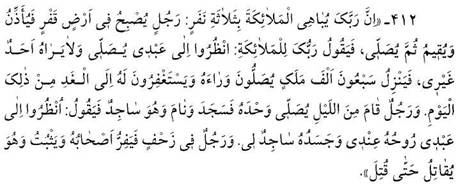 *
*
412.
“God is proud of three persons before angels:
1-
2-
One who rises up to perform prayer by himself goes into prostration and
is overtaken by sleep.
Herem God says: Look at My servant.
His spirit is with Me, but his body is in prostration before Me.
3-
One who is at war; his friends escape but he is steadfast, and fights on
till he is killed.”
e-
Include others in your Dua
*  *
*
413.
“The Holy Prophet (SAW) has said: Whenever you recite Dua, include
others in your Dua, for it is highly recommended.”
f-
Gather together for Dua
* ![]() *
*
-”And
withhold yourself with those who call on their Lord.”
*  *
*
414.
“It has never happened that forty people assemble in a place and invoke
God for something whose call has not been answered by God.
If they are not forty, let four people assemble and call on God ten times
so that their call will be answered, and if they are not four, even a single
person may call on God forty times, and recite Dua so that God will answer.”
* ![]() *
*
415.
“It has never happened that four persons assemble for invoking God, who
have not been disperse with their desires fulfilled.”
|
Saying
Amen in Dua |
One
who says “ameen” shares the Dua.
In verse 89 of the Quranic Chapter, Yunus, addressing Moses and Haroon,
God says:
* ![]() *
*
“The
prayer of you both has indeed been accepted.”
Infact,
Moses had recited Dua and Haroon had said: “ameen” but God attributes it to
both.
Ali
Ibne Aqabah has reported on the authority of Imam Sadeq (AS):
* ![]() *
*
416.
“Whenever my father was sad about something, he would gather women and
children for reciting Dua and they would say: “ameen”.
Sokooni
has reported on the authority of Imam Sadeq (AS):
* ![]() *
*
417.
“One who recites Dua and one who says ameen shares the Dua.”
g- Be humble
* ![]() *
*
“Call
on you Lord humbly and secretly.”
* ![]() *
*
418.
“Only revelations made to Moses is as follows:
*  *
*
“O
Moses! When you are calling on Me, be humble, broken-hearted, and fearful.
Rub your face against earth, and prostrate before Me with your best body
members. Raise
your hands in begging before Me in Qunut (communion with God) and invoke Me
fearfully in your supplications.”
*  *
*
419.
“O Jesus! Call on Me as a person who is being drowned and oppressed man
who has no helper.
O Jesus! Humble your heart before Me and remember Me privately most of
the time. Know
that My happiness is when you come to Me with fear and hope.
Don’t ever come to Me with a dead heart but with a living and happy
heart. Let
Me hear a sad voice.”
*  *
*
420.
“When God sent Moses and Haroon to Pharaoh, He said to them: Let not
their elegant garments frighten you, for his reins of affairs are in My hand.
Do not ever be surprised by his enjoying of the worldly wealth and its
ornaments, for if I wished, I could give you such ornaments that whenever
Pharaoh sees you, he would find himself incapable before it.”
*  *
*
- "But
I prefer you two to him.
Therefore I alienated the world from you, for this is the way I treat My
friends. I
will give them that amount of worldly blessings which a shepherd gives to his
sheep from the herbs of destruction.
I keep My friends from compromise with world in the same way that a kind
camel driver keeps his camels from precipices.
Therefore, keeping My friends from the world is not because they have no
value for Me but it is because I wish to give them a perfect share of safety and
honor.”
*  *
*
- “The
ornaments of My friends before Me are humility, modesty and the fear that have
dwelt in their hearts and are manifest in their bodies such a state is their
inner and outer form and will lead to their prosperity so that they will attain
the positions they desire.
Their victory lies in the same humility upon which they pride themselves.
This is the feature by which they are known.”
*  *
*
“O
Moses! Whenever you meet them, lower your wing for them, treat them saftly and
humble your heart and tongue for them and know that whoever frightens My
friends, has risen to fight Me and I will be wrathful to him on the Day of
Judgment.”
h-
Praise God before Dua
Hareth
Ibne Moghayreh has reported on the authority of Imam Sadeq (AS):
*  *
*
421.
“Whenever one of you has a desire, he should first praise God,
then send greetings to the Holy Prophet(SAW) and his progeny and finally invoke God for his desire.”
*  *
*
422.
“A person entered a mosque, performed two Rak’at of prayer and asked
something from God.
The Holy Prophet (SAW) said: This man has been in a hurry in the presence
of God. Another
man came, performed
a two-Rak’at prayer, then praised God and sent greetings to the
Messenger of God.
The Holy Prophet (SAW) said: Express your desire and it will be
fulfilled.”
*  *
*
423.
“In the book of Amiralmomenin, it has been pointed out: The place of
expressing is after praising God.
Therefore, whenever you wish to recite Dua, first praise God.”
*  *
*
“O
the One who are nearer to me than my Jagular vein! O the One who go between man
and his heart! O the One who are superior in the eyes! O the One who have no
likeness!”
Moavieh
Ibne Ammar has reported on the authority of Imam Sadeq (AS):
*  *
*
424.
“Praise God first, then confess your wrongdoings, then express your
desire. By
God! No one’s sin is forgiven except through confession.”
Issa
Ibne Abilghassem has reported on the authority of Imam Sadeq (AS):
*  *
*
425.
“Whenever one of you wishes to express his desires to God, he should
first praise God, for when a person wishes to ask something from a king, he will
use good words as much as possible.
Therefore, when you need something first praise God in this way.”
* 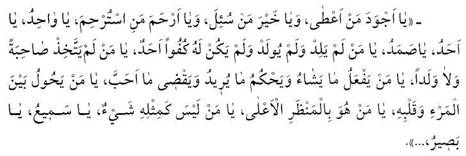 *
*
“O
you who are the Most Generous among the generous ones! O You who are the Best
one whom one can beg! O You who are the Most Merciful among the merciful ones! O
the One! O the Unique! O You on whom all depend! O You who beget not nor are You
begotton! O You the like of whom does not exist.
O You who have not chosen any wife nor child! O You who
will do whatever you wish! O You
who will decree whatever You will!
O you who will destine (determine) whatever you wish!
O You who go between man and his heart! O You who are supreme in outlook!
O You who are like nothing! O the All-hearing, O the All-seeing....”
*  *
*
“Pronounce
the Attributes of Allah as much as you can, for He has many attributes and then
send greetings to Mohammad and his progeny and then say:”
*  *
*
“O
God! Extend Your lawful sustenance to me; the amount by which I can save face;
pay my debts; observe the ties of kinship; and let it be an assistance by which
I can perform major and minor hajj.”
i-
Recite salawat (greeting) to the Holy Prophet and his progeny (AS)
Abu
Basir has reported on the authority of Imam Sadeq (AS):
*  *
*
426.
“The Holy Prophet said: Whoever forgets to recite salawat when my name
is mentioned before him, God will lead him to a wrong path through paradise.”
Ibnolghaddah
has reported on the authority of Imam Sadeq (AS):
*  *
*
427.
“”My father heard from a man who had hung himself to Kaba saying: O
God send greetings upon Muhammad.
He said to him: Don’t shorten that formula of blessing nor be unjust to
us, rather say: O God! Send Your greetings upon Mohammad and his household.”
* ![]() *
*
428.
“No one has done better than what you did.”
Jaber
has reported on the authority of Imam Baqer (AS):
* 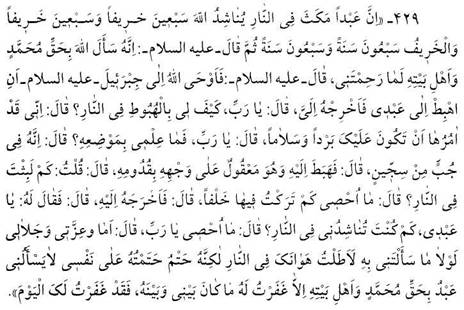 *
*
429.
“A man being in the Fire of Hell was calling a hundred and forty Kharif,
every Kharif having a hundred and forty years.
Then he invoke God through Mohammad and his household saying: Have mercy
on me. Here
God inspired Gabriel with a revelation saying: Descend towards my servant, bring
him to Me from Hell.
Gabriel said: O Lord! How can I go into Fire? Gabriel said: O Lord! How
can I go into Fire?
God said: I ordered the Fire to become cold and safe for you.
Gabriel said: O Lord! I do not know where he is.
God said: He is imprisoned in ditch.
Going to him and seeing that man’s feet were tied and hung by face,
Gabriel said to him: How long have you been in Fire?
He said: I do not know how long I have been left here?
Gabriel took him to God.
Then God said to him:
O
my servant! How long have you been calling on Me in Fire?
He
said: I do not know My Lord! God said: By My Glory! If you had not uttered these
words, I would have kept you in Hell, for I have made it My duty to forgive any
man who invokes Me through Muhammad and his household.
It is for this reason that I have forgive you to day.”
* 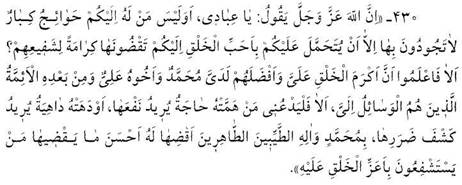 *
*
430.
“God says: O My servant! Has it not happened that someone asks a big
thing from you but you are not willing to fulfill it unless he brings the most
believed person to persuade you to fulfill those desires for the sake of that
intercessor? Let
it be known to you that the most honorable and supreme creature with Me is
Muhammad and his brother Ali and the Imams who are the medium of nearness to Me.
Be aware that whoever has a great desire and wishes for a benefit or
removal of a harm, if he calls on Me through Muhammad and his pure progeny, I
will fulfill his desires far better than fulfilling the desire of one who has
taken the most believed creature of God as an intercessor.”
Salman
said: I called on God and requested Him to give me something which is superior
to and more profitable than ruling over the whole world.
I invoked God through these honorable persons to give me a tongue which
praises God, a heart which thanks His blessing, a body which can forbear all
hardships. God
too fulfilled all my desires.
What I asked God is a thousand times better than ruling over the whole
world.
Muhammad
Ibne Ali Babvieh has reported on the authority of Imam Sadeq (AS):
431. “Zoleikha
said: Praise is due to God who makes kings slave because of their sins and kings
slaves as a result of their devotion.
Yusuf (AS) said: O Zoleikha! What prompted you to do so?
Zoleikha said: The beauty of your face, O Yusuf!
Yusuf said: So what will you do if you see the last prophet, whose name
is Muhammad (SAW) and he is more beautiful, more good tempered and more generous
than I am? Zoleikha
said: You are right, Yusuf said: how do you know that I am telling the truth?
Zoleikha said: As soon as you mentioned his name, his love was placed in
my heart. Here
God inspired Yusuf that Zoleikha tells the truth and since he loves Muhammad I
love her too. Then
God ordered Yusuf to marry Zoleikha.
Jaber has reported on the authority of Imam Sadeq (AS):
*  *
*
432. “One
of angels asked God to give him the power of hearing God’s servant.
God too fulfilled his desire, hence whenever a believer recites Salawat,
the angel will firstly say peace be upon you and secondly he will say to the
Holy Prophet (SAW): O Messenger of Allah! Such and such a person sends greetings
upon you and the Holy Prophet too will say: Peace be upon him.”
Amiralmomenin (AS) has said:
* 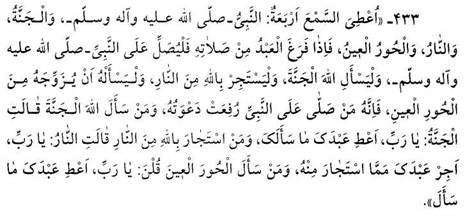 *
*
433. “Four
persons were given special hearing power: The Holy Prophet (SAW), paradise, Hell
and Houri (nymph of paradise).
Whenever a servant of God, completes his prayer, he should recite
Salawaat, long for paradise, take refuge to Him from Hell and wish to marry a
Houri, for whoever recites Salawaat for the Holy Prophet (SAW), his Dua will go
up to heavens.
Whoever asks God for paradise, paradise will say: O God! Give your
servant whatever he wishes.
O whoever seek refuge to God from Hell, the Hell will say: O God! Give
refuge to Your servant from what he has sought refuge.
And whoever desires Houri, the Houri will say: O God! Grant the desire of
Your servant.”
Muhammad Ibne Moslem has reported on the authority of Imam Baqer or
Imam Sadeq (AS):
*  *
*
434. “There
is nothing more heavy in the scales of deeds than Salawaat.
On the Day of Judgement, a man’s deeds are brought and put in the
scales. They
see they are light but the Holy Prophet (SAW) brings Salwaats and put then in
the scales making them heavy.”
Hesham Ibne Saalem has reported on the authority of Imam Sadeq (AS):
435. “Dua
is hidden from God (not answered) unless the supplicant recites Salawaat.”
Imam Sadeq (AS) has also said:
*  *
*
436. “Whoever
recites Dua without mentioning the name of the Holy Prophet (SAW), that Dua will
hover above him till he mentions the Holy Prophet’s name in which case his Dua
will go up to heavens.”
*  *
*
437. “Whoever
has a desire, should recite Salawaat first, then he should ask for his desire
and bring his Dua to an end with Salawaat, for God is too generous to answer two
sides of Dua but abandon the middle of it since Salawaat is not hidden to
Him.”
j- Weep
while you are reciting Dua
Weeping is the sign of humility and supreme position for the
following reasons:
Firstly-
Weeping suggests tender-heartedness and tender-heartedness suggests devotion and
devotion entails fulfillment of Dua.
Imam Sadeq (AS) has said:
*  *
*
438. “Whenever
you trembled to the skin, your eyes were replete with tears, and your heart
became apprehensive, keep that state well, for you have attained your
objective.”
On the contrary, dry eyes and no tears are the sign of
hardheartedness which indicate:
1- Being
away from God.
Addressing Moses (AS) God said:
* ![]() *
*
“O Moses! Let not your desires be too far, for it hardens your heart and a
hard heart is distant from Me.”
2- The
Dua recited by such a person is not answered, for Imam Sadeq (AS) has said:
* ![]() *
*
“God does not accept any Dua from a hard heart.”
Secondly-
Weeping suggests man’s cutting off of hope with all but God and a sign
of being humble, about which the Holy Prophet (SAW) has said:
* 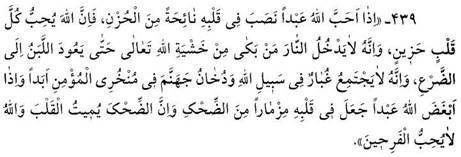 *
*
439. “Whenever
God loves a servant, He will place a hue of sorrow in his heart, for He loves
grief-stricken heart.
One who is weeping out of fear for God, will not enter Hell so long as
milk does not return to a mother’s breast.
One who endeavors in the way of God, will never go to Hell.
Whenever God hates a man, He will place in his heart a hymn of laugh
which will make his heart wither.
God does not love those who indulge in merrymaking.”
Thirdly- Weeping
is concordant with God’s decree to His Messengers including to prophet Jesus
(AS):
* 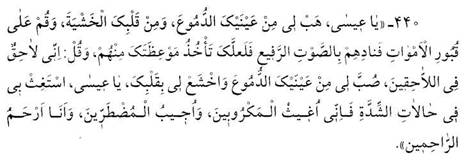 *
*
440. “O
Jesus! Bring to me as gift the tears of your eyes and the tear of your heart.
Stand on the graveside of the deceased and call them loudly so that they
will hear your sermon say to yourself: I too will join them.
Shed tears for My sake and humble your heart to Me.
O Jesus! Seek help from Me in hardships, for I will help the
grief-stricken ones and answer the depressed ones, since I am the Most Merciful
of the merciful ones.”
And in His revelation to Moses (AS) God says:
* 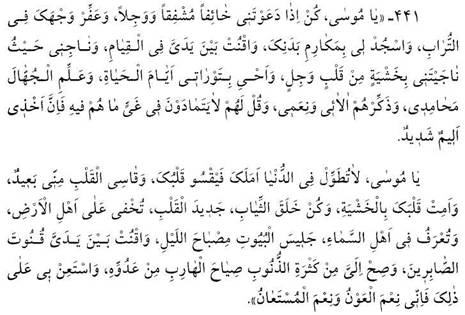 *
*
441. “O
Moses! When you are calling upon Me, you should be fearful, sympathetic and
broken-hearted.
Rub your face against the earth, and prostrate before Me with your best
body parts. When
you are standing before Me, raise your hands for begging in Qunut and invoke Me
fearfully in supplication.
During your lifetime, you must enliven My Torah, teach My virtues to the
ignorant and remind them of My blessings and say to them: Do not ever keep on
staying in bewilderment, for My chastisement will be painful.
O Moses! Let not your desires be too far in the world, for it will make
you hardheated and the hardhearted are distant from Me.
Let your heart wither from fear of Me, let your garment be old and torn
but your heart new.
Be unknown for the inhabitants of the earth and familiar for the
inhabitants of heavens.
Dwell at home and keep awake praying at night, be obedient to Me as the
patient ones, cry out towards Me because of too many sins, cry out as a man who
is escaping from the enemy and seek My assistance, for I am the Best Helper.”
God has also said:
*  *
*
442. “O
Moses! Make Me your shield and leave to Me your treasure which is your good
deeds.”
Fourthly-There
are virtues in shedding tears which are not found in other prayers.
In a Hadith, we read:
* ![]() *
*
443. “Between
paradise and Hell, there is a defile which no one can pass but those who shed
tears out of fear of God.”
It has been reported on the authority of the Holy Prophet (SAW):
*  *
*
444. “God
blessed Me and said: By My Glory! What those who shed tears receive from Me can
never be received by the worshippers.
I will build palaces for them in lofty places, and others will not share
it with them.”
God inspired prophet Moses in this way:
*  *
*
445. “Cry
for yourself as long as you are in this world, fear those things which make you
entitled to Fire and annihilation.
Don’t by deceived by ornaments and beauty of the worldly life.”
God inspired prophet Jesus in this way:
*  *
*
446. “O
Issa, son of Maryam! Cry for yourself as a person who is saying farewell to his
family, leaving the world for those who love it and is fond of things he has
with God.”
It has been reported on the authority of Amiralmomenin (AS):
*  *
*
447. “When
God was speaking to Moses (AS), Allah’s interlocutor said: O God! What is the
reward of one who sheds tears out of fear of You?
God said: O Moses! I will protect his face from the Fire of Hell and I
will spare him on a Day when there is loud cries.”
Imam Sadeq (AS) has said:
*  *
*
448. “All
eyes are weeping on the Day of Judgment except three eyes: Those eyes which do
not see unlawful things, those eyes which pass the night in prayer and those
eyes which shed tear out of fear of God.”
*  *
*
449. “Every
thing has a weight and a measure save tear a drop of which can extinguish seas
of fire. When
eyes are replete with tears, that face will experience neither hardship nor
disgrace on the Day of Judgment.
When tears run from eyes, God will make that face Haram (forbidden) for
the Fire. If
someone cries for an Ummah, God will make all of them entitled to His mercy.”
* 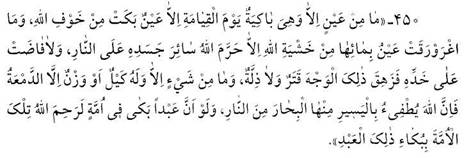 *
*
450. “On
the Day of Judgement there are no eyes which are not weeping save those eyes
which had wept out of fear of God.
No eyes were replete with tears out of fear of God unless God made other
parts of his body haraam to the Fire.
No tearful eyes have ever experienced hardship and humiliation.
Everything has a weight and measure save tears with a small amount of
which God will extinguish seas of fire.
If a man weeps for an ummah, God will make that ummah entitled to His
mercy as a result of the weeping of the same servant.”
Moavieh Ibne Ammar has reported on the authority of Imam Sadeq (AS):
*  *
*
451. “In
the last will of the Holy Prophet (SAW) to Imam Ali (AS) it has been pointed
out: O Ali! I recommend you to observe some virtues.
Then the Holy Prophet said: O God! Help Ali to observe them.
Then he enumerated those virtues until he said: The fourth one is weeping
much out of fear of God against every drop of which, a thousand dwellings will
be built in paradise
Abu Hamzeh has reported on the authority of Imam Baqer (AS):
*  *
*
452. “Nothing
is more beloved to God than a drop of tear shed in the dark of night for the
fear of Allah.”
Ka’abolahbar says: By the One in whose hand my life is! If I weep out
of fear of God and tears run on my face, it is better for me than a mountain of
gold given as alms in the way of God.
Ibne Abi Amir has reported on the authority of Imam Sadeq (AS):
* 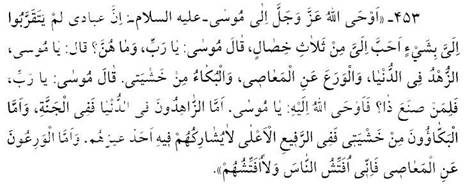 *
*
453. “Grand
inspired prophet Moses (AS): My servants did not gain favor through anything
more beloved than three virtues.
Moses said: O God! What are those virtues?
God said: O Moses! Those virtues are piety in this world, keeping away
from sin, and weeping out of fear of Me.”
Moses said: O God! What is reward for one who has such qualities?
God said: O Moses! The pious of this world will dwell in paradise.
Those who weep out of fear of Me have a superior position which no one
will share, and as for those who have abandoned sins, on the Day of Judgment, I
will question all but I will not question them.”
In the farewell sermon of the Holy Prophet, it has been pointed out:
*  *
*
454. “One
who sheds tear out of fear of God, against every drop of those tears, his deeds
and rewards will be as big as Mt. Ohod recorded for him and against each drop of
those tears, a spring, there will be cities and castles no eyes have seen, no
ears have heard of, and no mind has imagined.”
It has been reported on the authority of Imam Baqer (AS):
*  *
*
455. “Prophet
Ibrahim (AS) said: O God! What is the reward of a face wet with tears shed out
of fear of You?
God said: The reward is forgiveness, and the position will be My pleasure
on the Day of Judgement.”
Ishaq Ibne Ammar reports: I said to Imam Sadeq (AS): I recite Dua and I
wish I could weep, but tears do not come to my eyes.
However when I remember a relative who has died, my heart is broken and
my tear starts running.
Is it something permissible?
Imam Sadeq (AS) said:
* ![]() *
*
456. “Yes,
it is: Remember the deceased and when your heart is broken weep for God’s
sake.”
|
Tabaaki (Pose for weeping) |
Even if you don’t feel like weeping, pose for it so that tears will
come to your eyes.
In connection with Tabaaki, Imam Sadeq (AS) has said:
* ![]() *
*
457. “Even
if you are not weeping, pose as someone who is weeping.”
Saeed Ibne Yassaar reports: I said to Imam Sadeq (AS): If tears do not
come to my eyes while I am reciting Dua, can I pose as someone who is weeping?
The Imam said:
* ![]() *
*
458. “Yes
even if it is the size of a head of a fly.”
Abi Hamzeh has reported on the authority of Imam Sadeq (AS):
*  *
*
459. “When
you fear something happen, or desire something, first praise God and glorify Him
as He deserves, then recite Salawaat and then shed tears even if it is the size
of a head of a fly, for my father said: The nearest state of God’s servant to
Him is to go into prostration and weep in that state.”
Imam Sadeq (AS) has also said:
* ![]() *
*
460. “If
weeping does not give you a positive response, and tears do not come to your
eyes, pose as one who is weeping even if it is the size of the head of a fly,
for blessed will be your state.”
Admonition
While reciting Dua, you can subdue your eyes so as to shed tears:
-Remember your cardinal sins and disgrace on the Day of Judgment when all
creatures fear God who is the Ruler on that day and knows everything.
-Picture the scene of the Day of Judgment before your eyes when tongues
will become dumb and eloquent speaker will become silent, but body organs will
have coarse voices and sweat will cover people in a way that it drops down from
their ear lobes.
A Day when hidden secrets are disclosed and man’s heart and mind become
evident; evils are uncovered and no one will take notice of another.
It has been reported on the authority of the Holy Prophet of Islam (SAW):
*  *
*
461. “On
the Day of Judgement, people gather together barefooted and empty-handed while
they are sweating all over.”
Hearing this, Soodeh, the wife of the Holy Prophet (SAW) said: Woe to
me! Will people see one another?
The Holy Prophet said:
* ![]() *
*
“Everyone is busy and no one will take notice of others.”
The Holy Prophet (SAW) then invoked verse 37 of the Quranic Chapter,
Abassa:
* ![]() *
*
“Every man of them shall on that day have an affair which will occupy
him.”
And said:
* 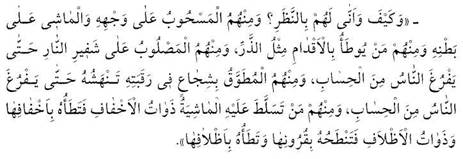 *
*
“How can they look at one another while they are pulling some people on
their faces, some people on their ballies and crucifying others near the Fire
till people get through with reckoning.
They hang snakes round the necks of some people to bite them, while
others are being crushed by quadrapeds and the animals which have horns strike
others with their horns and crush them under their feet.”
Caution
Know that weeping to God and invocation with the aim to be redeemed from
sins is a virtue but as long as there is no separation from sin, it will be
useless. in
this connection, Imam Zeinol Abedeen (AS) has said:
*  *
*
462. “Fear
of God does not mean weeping or shedding tears, for as long as there is no piety
which keeps him from sins, the fear is false.”
It has been reported on the authority of the Holy Prophet (SAW):
*  *
*
463. “One
day Prophet Moses (AS) saw a friend in prostration on his way.
Moses passed by him and upon returning found him still in prostration.
Moses said: If your desire were in my hand, I would fulfill it.
God inspired him: O Moses! I will not answer him unless he stops his
indecent deeds and turn to what I love.”
In another Hadith, we read:
*  *
*
464. “One
day prophet Moses on his way saw a man who was weeping.
He went his way but when he passed by him again, found the man still
weeping. Moses
said: O God! Your servant is weeping out of fear of You.
God said: O Moses! Even if this man weeps to death, I will not forgive
him as long as he loves the world.”
In a revelation to Moses, we read:
* ![]() *
*
465. “O
Moses! Call upon Me with an innocent heart and a truthful tongue.”
It has been reported on the authority of Amiralmomenin (AS):
*  *
*
466. “Dua
is key to prosperity and deliverance.
The best Dua is one which comes out of a cleansed breast and a pious
heart. Invocation
leads to deliverance and devotion leads to relief.
Therefore, whenever hardships increase, you have to supplicate to God.”
k- Confess
your sins before Dua
Firstly- Confession shows that man has stopped hoping in anyone but God.
Secondly- Confession is the sign of being humble and anyone who is humble is
highly promoted by God.
In a Hadith, we read:
467. “A
pious man served God for seventy years.
He used to fast all days and engage in prayer all nights.
He invoked God for something but was not answered.
He turned to himself saying: There must be something wrong with yourself,
for if there were any good in you, your desire would be fulfilled.
At this time, God sent him an angel saying: O son of Adam! This very
moment you made yourself humble is better than all your prayers in the past.”
It has been reported on the authority of Imam Baqer (AS):
*  *
*
468. “God
sent revelation to Moses saying: Do you know why I chose you to speak to and not
others? Moses
said: No, my Lord! God said: O Moses! I searched among My servants every where
but I did not find any one more humble than you, for whenever you perform
prayer, you place your face on the earth.”
In another Hadith, we read:
*  *
*
469. “I
searched among My servants everywhere but I did not find any one more humble
than you. For
this reason I wish to make your position superior among My creatures.”
In a Hadith, we read:
470. “God
sent revelation to Moses (AS) saying: Go up a mountain and invoke Me.
There were several mountain which made itself humble saying to itself: I
am too small for invocation by a messenger of the Lord of the worlds.
At this time, God inspired Moses to go up the same mountain, for that
mountain had made itself humble.”
it has been reported on the authority of the Holy Prophet of Islam
(SAW):
*  *
*
471. “There
are things for which God will not give but good: Humility for which God will
promote man’s position, modesty for which God will give self-respect and
renouncing what is forbidden for which God will give wealth, and freedom from
want.”
The Holy Prophet (SAW) has also said:
* ![]() *
*
472. “God
pleasure lies in humility and making the self humble.”
In God’s revelation to prophet David, we read:
*  *
*
473. “O
David: I have placed five things but people are looking for them in five other
things and do not find them.”
*  *
*
“I have placed knowledge in a thirst for it and endeavor but people
look for it in surfeit and comfort and do not find it.”
* ![]() *
*
“I
have placed honor in obedience to Myself but people seek it in serving
the kings and do not find it.”
* ![]() *
*
“I have placed freedom from want in contentment but people seek it
in too much wealth and do not find it.”
*  *
*
“I have placed My pleasure, in the discontentment of self but people
look for it in the contentment of self but do not find it.”
* ![]() *
*
Thirdly- One of the other advantages of confessing the sins, is fear of
God and tender heartedness about which Imam Sadeq (AS) has said:
* ![]() *
*
“Whenever the heart of one of you is broken, he should recite Dua,
for man’s heart is not broken unless it has been refined.”
Fourthly- On many occasions when the heart is broken, it will lead to the
shedding of tears which is a constituent part of Dua.
Fifthly- Imam Sadeq (AS) has said:
*  *
*
- “First
praise God, then confess your sins, and finally invoke God, for no one has ever
renounced sin save through confessing it.”
Therefore confessing the sins has five advantages:
1-
Cause you to return to God
2- Cause
your heart to be broken
3-
Cause you to be tender-hearted, a sign of devotion, hence fulfillment of
Dua.
4- Cause
you to weep and weeping is the best way to approach God
5-
Complying with the decree of Imam Sadeq (AS) with all your heart
l-
Return to God with all your heart.
Evidently when you know that some one who is speaking to you is heedless
of what he says, you too will not pay attention to what he is saying.
In this connection, Imam Sadeq (AS) says:
*  *
*
474. “Some
one who wishes to know what his rank with God is, should see what God’s rank
with him is, for God gives His servant the rank be gives to God.”
Amir al-mominin (AS) said:
* ![]() *
*
475. “God
will not accept a Dua recited without the presence of heart.”
Seif Ibne Omeireh has reported on the authority of Imam Sadeq (AS):
* ![]() *
*
476. “Whenever
you call on God, turn to him with all your heart.”
One of the revelations of God to prophet Jesus (AS) is:
*  *
*
-“do not recite Dua without supplication hence devote yourself with al your
heart, for if you call on Me in this way, I will answer you.”
It has been reported on the authority of the Infallibles (AS):
* ![]() *
*
477. “Two
Rak-at of prayer with meditation is better than prayer performed throughout the
night while one’s heart is preoccupied with anyone but God.”
* ![]() *
*
478. “Only
that part of prayer in which you have presence of heart will benefit you.”
It has been reported on the authority of prophet (Enoch) Edris (AS):
*  *
*
479. “Whenever
you perform prayer, turn your memories and thought from other things.
Call on the God while you are pure and happy and beseech Him your
interests and what is advisable to you humbly, modestly and obediently.”
*  *
*
480. “Whenever
you fast, purify yourselves from all uncleanness and impurity.
Fast for God with pure and refined hearts.
Purify yourselves even from thinking about sins, for God considers as
impure the polluted hearts and impure intentions.”
m- Recite
Dua even when you don’t desire anything.
The Holy Prophet of Islam (SAW) said to Abazar:
* 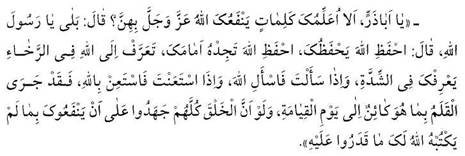 *
*
“O Abazar! Shall I teach you words which will benefit you?
Abazar said: Yes, O Messenger of Allah.
The Holy Prophet said: You preserve God so that He will preserve you.
If you preserve Him, you will find Him in front of you.
In the days of ease and comfort, he familiar with God so that He will
know you in the days of need and hardships.
If you have any desire invoke God and if you seek help, seek only from
Him. Whatever
exists in the world is destined by His pen till the Day of Judgment.
If all people try to do everything possible to benefit you but God has
not written it for you, they will never be able to do so.”
Haroon Ibne Kharejah has reported on the authority of Imam Sadeq (AS):
* ![]() *
*
-”Dua in the time of ease and comfort is good for the days of
affliction.”
Imam Sadeq (AS) has also said:
*  *
*
- “Should anyone who is afraid of tribulation, recite Dua
beforehand, God will never show him that tribulation.”
Imam Zaynol Abideen (AS) has said:
* ![]() *
*
481. “Reciting
Dua after the descent of tribulation has no benefit.”
n- Recite
Dua for your brothers in faith and ask them to recite Dua for you:
Ibne Abi Omayar has reported on the authority of Imam Sadeq (AS):
* ![]() *
*
482. “Whoever
recites Dua for forty believers and then for himself, his Dua will be
fulfilled.”
And he is advised to say the following after recommended midnight
prayer in prostration:
*  *
*
483. “O
Lord of dawn and the ten nights, and the even and the odd and the night when it
departs and the Lord and God of everything, send greetings to Muhammad and his
progeny and give me and to such and such a person what suits You and do not give
us what we deserve, O the Preserver and Forgiver!”
It has been reported on the authority of the Holy Prophet (SAW):
* ![]() *
*
484. “Nothing
is more swiftly answered than a Dua recited for others.”
Fazl Ibne Yassaar has reported on the authority of Imam Baqer (AS):
* ![]() *
*
485. “The
most swiftly answered Dua is that of a believer for his brother in faith in his
absence.”
*  *
*
486. “The
Dua recited by a mother for his believing brother in his absence is answered
more swiftly than other Duas.
When he recites this Dua, an angel is missioned to say: Ameen and the
like of it for you.”
Abdullah Ibne Sanan has reported on the authority of Imam Sadeq (AS):
* ![]() *
*
487. “A
man’s Dua in his believing brother’s absence will have his sustenance
increased and the evils removed.”
Imam Sadeq (AS) has also said:
* 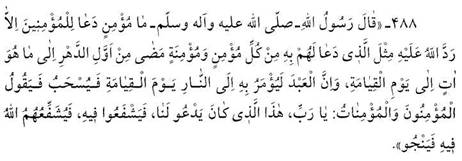 *
*
488. “The
Messenger of Allah said: Whenever a believer recites Dua for other believers,
God will return the same Dua to him as many as the number of every believing man
and woman existing from the beginning of creation to the Day of Judgment.
On such a day, a servant is brought and a decree says: Throw him into
Fire. The
angels drag him towards Fire.
At this time the believing men and women say: O God! This is the same man
who has recited Dua for us.
It is here that they intercede for this man.
God too will accept their intercession and he will be delivered.”
Ali Ibne Ibrahim has reported on the authority of his father: I saw
Abdullah Ibne Jandab in Arafaat raising his hands towards heaven and tears
running from his eyes.
When all the people had left I said to him: O Aba Muhammad! I saw no one
so much absorbed in Dua as you were.
He said: By God! I did not recite Dua save for my brothers in faith, for
Imam Kazem (AS) had said to me:
* ![]() *
*
489. “Whoever
recites Dua in the absence of his brother in faith, there is a call from Divine
throne saying: Let a hundred thousand times more than it be for you.”
I thought it was not advisable to leave a hundred thousand Duas which
was certainly answered for one Dua for myself, which might or might not be
answered.
Ibne Abi Omayreh has reported on the authority of Zeid Nerssi: Moavieh
Ibne Wahab and I were in Arafaat.
He was reciting Dua which his eyes were full of tears.
Listening carefully to him, I found out that he was not reciting a single
Dua for himself, rather he was reciting Dua for people from here and there in
world mentioning their names and their fathers names.
When people left Arafaat, I said to him: O uncle! I saw something strange
about you. He
said: What was strange?
I said: In this holy place, you considered your brethren prior to
yourself and recited Dua for others! He said: O my nephew! Don’t be surprised
at this, for I heard from my master of former and future generations after his
innocent fathers (AS), (If I lie, let my ears become deaf, my eyes blind and
deprived from the Holy Prophet’s intercession) as saying:
* 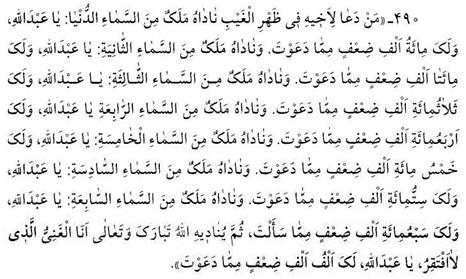 *
*
490. “Whoever
recites Dua in the absence of his brother in faith, an angel from heaven will
call him saying: O servant of an angel from thousand times more than it be for
you. And
an angel for the second heaven will call: O servant of God! Let two hundred
thousand times more than that Dua be for you and angel from the third heaven
will call: O servant of God! Let three hundred thousand times more than it be
for you. And
an angel from the fifth heaven will call: O servant of God! Let five hundred
thousand times more than it be for you.
And an angel from the sixth heaven will call: O servant of God! Let six
hundred thousand times more than it be for you.
And an angel from the seventh heaven will call: O servant of God! Let
seven hundred thousand times more than it be for you.
Then, God will say: I am the dependent One who will never become poor.
O servant of God! Let a million times more than it be for you.”
O my nephew! which one is great: What I did or what you are saying?
|
The Necessity of Affection among Brethren |
When reciting Dua for a brother in faith, you should love him from the
bottom of your heart and your Dua must be whole-hearted wishing that God will
answer it. It
is in this case that both your Dua for him will be fulfilled and manifold
rewards will be given to him, for your love of him is a virtue and reciting Dua
for him is another virtue.
Therefore your Dua has three virtues, that is, love, benevolence and Dua.
If you ask God anything for him, invoke it from the bottom of your heart
and intercede for him in your Dua with the God who is the Most Generous among
the generous ones, for beyond a doubt, God is more Generous, more powerful and
Praiseworthy than you in giving a benefit to His servant.
In interpreting verse 26 of the Quranic Chapter, Shura:
* ![]() *
*
“And He answers those who believe and do good deeds, and gives them
more out of His grace.”
Jaber has reported on the authority of Imam Baqer (AS):
*  *
*
491. “This
verse is aimed at a believer who recites Dua for his brother in faith in his
absence. It
is here that an angel will say: You will be given what you have wished for him
due to your love of him.”
It is related that a righteous man used to recite Dua for his
brethren after performing his prayer in mosque.
One day when he was leaving the mosque, it was said to him that his
father had died.
When he was through with the funeral service, he started dividing what
his father had left among the same brethren for whom he had recited Dua they
said to him: What is it you are doing?
He said: I wished paradise for them in the House of God so why should I
be stingy about the wealth which is doomed to perish.
Dear reader! Ponder on the words of Imam Sadeq (AS) who has said:
*  *
*
492. “Whenever
two believers shake hand, a hundred mercies are divided between them the ninety
nine of which is for one who loves his friend more.”
It has been reported on the authority of the Infallibles (AS):
* ![]() *
*
493. “No
man’s faith is perfect unless he loves his brother in faith.”
* ![]() *
*
494. “Our
followers are those who love one another and are forgiving for our sake.”
Abdolmomen Ansari reports: One day I went to Imam Moosa.
Muhammad Ibne Abdullah Ja-afari too was there.
As soon as I gave him a smile, the Imam said:
* ![]() *
*
495. “Do
you love him?”
I said: Yes.
I love him only for your sake.
The Imam said:
*  *
*
-“He is your brother in faith.
A believer is both paternal and maternal brother of another believer.
Cursed and cursed is one who accuses his brother in faith.
Cursed and cursed is one who deceives his brother in faith.
Cursed and cursed is one who does not wish good for his brother in faith.
Cursed and cursed is one who consider himself prior to his brother in
faith. Cursed
and cursed is one who hides himself from his brother in faith. Cursed and cursed
is one who backbites his brother.”
Imam Moosa (AS) has also said:
* ![]() *
*
496. “The
strongest rope (covenant) is faith, friendship and enmity in the way of God.”
Imam Sadeq (AS) has said:
*  *
*
497. “Everything
reposes on another thing.
A believer too reposes alongside his brother in faith as a bird reposes
near another bird.
Have you not experienced it?”
*  *
*
498. “A
believer is the brother of another believer, his eyes, his mirror and his guide.
He does not betray him, deceives or oppresses nor lies to him or
backbites him.”
*  *
*
499. “Whenever
two or three believers gather round another brother in faith from whose evil
they are immune and hope in what he has, should they invoke God, their Dua will
be answered. If
they have any desire, it will be fulfilled.
If they desire anything, it will be given and if they keep silent, God
Himself will fulfill their desires.”
*  *
*
500. “Whoever
goes to visit his brother only for the sake of God and not for other things, and
hopes to attain rewards promised by God, God will assign seventy thousand angels
to say to him: Stay happy for paradise will be pleasant for you.”
*  *
*
501. “The
Holy Prophet of Islam (SAW): Whoever trades with people but is fair to them,
speaks to people but does not lie, makes promise but does not breach it, will be
among those whose backbite is forbidden whose fairness is perfect, whose justice
is open and brotherhood with whom is incumbent.”
Imam Baqer (AS) has said:
*  *
*
502. “To
God belongs a paradise to which only three persons are entitled to enter: One
who passes a fair judgment even against himself, one who visits his brother in
faith to please God, and one who is self-sacrificial and considers his brother
in faith prior to himself.”
*  *
*
503. “Whenever
two believers visit each other and shake hands, God will place His hand between
their hands and shakes the hand of one who loves his friend more.”
*  *
*
504. The
Holy Prophet (SAW) has said: “Whenever you meet greet each other with salaam
(peace) and shake hands and whenever you part, do so while seeking forgiveness
for each other.”
Amiralmomenin (AS) has reported on the authority of the Holy Prophet (SAW):
* 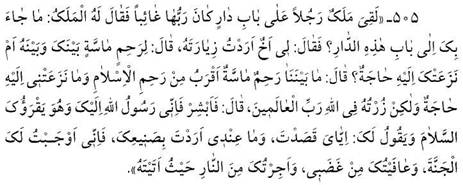 *
*
505. An
angel saw a man standing at the door of a house whose master was not at home.
The angel said to him: Why have you come here?
The man said: I have a brother in faith whom I wish to see.
The angel said: Has any kind of relationship or need brought you here?
The man said: There is no closer relationship between us than Islam.
In the meantime I do not want anything from him but I wish to visit him
for the pleasure of God.
The angel said: I am the messenger of God to you bringing the good
tidings that God has sent His greetings to you and says: Is this visit for My
sake? Are
you expecting a reward from Me with your deed?
I entitle you to paradise, keeping you away from My wrath and delivered
you from the Fire of Hell.”
*  *
*
506. “Visiting
a learned man is as prayer.
Visiting a just leader is as prayer.
Giving a kind look at parents is as prayer and visiting a brother in
faith for the sake of God is also prayer.”
* ![]() *
*
507. “God
has not established brotherhood between two believers to whom he has not given a
rank.”
* ![]() *
*
508. “Whoever
considers someone as a brother in the way of God, he has taken an abode in
paradise.”
*  *
*
509. “Whoever
respects his brother in faith, has respected God.
What do you think God will do to one who has respected God?
Omar Ibne Harith has reported on the authority of Jaber and he has
reported on the authority of Imam Baqer (AS):
* 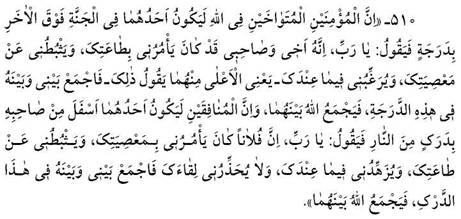 *
*
510. “Two
believers who have become brothers in the way of God, when one of them attains a
rank superior to another in paradise, will say: O God! He was my brother and
friend who enjoined me to obey You, deterred me from wrong doings and encouraged
me about your rewards -these words are uttered by one who stands at a higher
rank - O God! Place him alongside me.
God too will accept his request placing them in the same position.
As for two hypocrites, when one of them in an inferior position, will
say: O God! such a person encouraged me to wrong doing, dettered me from obeying
You, discouraged me about Your rewards and never made me to fear You.
Therefore, place him and me together in this inferior rank.
God too will place these two in the same place.”
The Imam Baqer (AS) recited verse 67 of the Quranic Chapter, Zukhruf,
as follow:
* ![]() *
*
“The friends shall on the day be enemies one to another, except those who
guard against evil.”
|
Fulfilling
a believer’s
desire |
Eban
Ibne Taghalab has reported on the authority of Imam Sadeq (AS):
*  *
*
511.
“Whenever a believer requests something from his brother in faith and
he rejects it while he has the power to fulfill it, God will make a snake
dominate him in his grave so as to bite his fingers.”
Ismaeel
Ibne Ammar reports: I said to Imam Sadeq (AS): Is believer a blessing?
The Imam said:
*  *
*
512.
“Yes, a believer turning to his brother in faith to fulfill his desire
is a blessing God has sent for him.
God has made it a means of nearness to Him.
Hence if he fulfills that need, he has the power to fulfill it, he has
rejected God’s blessing.
In this case, that mercy is reserved for the person whose desire has not
been accepted.”
*  *
*
“Whoever
acts to fulfill the desire of his brother in faith but does not endeavor as he
should, he has betrayed God, the Messenger and believers.”
*  *
*
“Whenever
a believer goes to his brother in faith to beg something but his brother in
faith fails to help him despite having the means, God will make him fulfill the
desires of our enemies so as to chastise him through this deed.”
*  *
*
“Whoever
humiliates an indigent believer for destitution, God will humiliate him before
people and is His enemy till the Day of Resurrection.”
*  *
*
“One
in whose presence they backbite his brother in faith, should he help him, God
will help him in the world and the Hereafter and if he does not help him despite
his capability, God will humiliate him both in the world and in the
Hereafter.”
* ![]() *
*
513.
“Woe to Hussein! Are you humiliating all believers?”
I said: I seek refuge with Allah from what you say.
The Imam (AS) said:
![]() *
*
“They
have informed me that you are sacrificing a lamb for your company at every
halting place.”
*  *
*
“Don’t
you see that there may be among them a person who wishes to act as you but has
no means, hence he is humiliated?”
I said: “O son of the Messenger of Allah! I seek forgiveness from God
and I will not do it again.”
The Imam (AS) said:
*  *
*
“My
ummah will be on the good path as long as they love each other, return the trust
to its owner and give alms, for if they will come to my ummah a time when their
heart will become evil and their appearance good because of avarice in world,
their deed is hypocrisy and they do not fear that God will send a severe
tribulation in which people call on Him as one who is being drowned but God will
not answer them.”
* ![]() *
*
514.
“Won’t you like to tell you about the rewards which are in your
circumambulation?”
*  *
*
- Whoever
comes to this House and knows his right, he must perform circumambulation seven
times, perform two Rak-at of prayer in the position of Ibrahim (AS), God will
have ten thousand virtues written for him and will promote him ten thousand
times.”
* ![]() *
*
“Won’t
you like me to tell you something better?”
*  *
*
“Whoever
fulfills the desire of his brother in faith, is a man who has performed
circumambulation and then said: Whenever a believer asks something form his
brother in faith and the latter fails to fulfill it despite his capability, God
will make a snake dominate him in his grave so as to bite his fingers.”
The Imam said:
* ![]() *
*
515.
“By the Lord of this House, I do not have anything on me today.”
*  *
*
“Yes,
but I heard from my father who quoted the messenger of Allah as saying: Whoever
fulfills the desire of his brother in faith, is as a man who has worshipped God
nine thousand years, keeping fast the days and performing prayers all nights.”
|
Make
Your Brother in Faith Happy |
Now
that it has become clear to you as to how much God pays attention to love and
affection among brothers in faith, let it be known to you that the best deed to
God is to make them happy.
Hussein
Ibne Yaghteen has reported on the authority of his father and he too on the
authority of his father and he too on the authority of his grand father:
I was in Ahwas where one of the scribes of “Yahya Ibne Khaled” became
the governor of our city.
I owed some tax and if I paid it, I would lose everything including my
own house. I
was told that he was one of the followers of the Household of the Holy Prophet
but I feared to go to him.
The only option was to seek help from God.
Hence I went to Imam Sadeq (AS) seeking help from him.
The Imam wrote the following on a piece of paper:
*  *
*
516.
“In the Name of Allah, the Most Compassionate, the Most Merciful, there
is for God a shade under the Throne in which only one abides who removes sorrows
from his brother in faith, or helps him wholeheartedly even if it is as small as
half a date. The
one who carries this letter is your brother in faith, peace be to you.”
This
continued till it was Hajj days.
I said to myself: By God! This happiness can not be compensated by
anything unless I go on Hajj pilgrimage, recite Dua for this man, go to my
master, Imam Sadeq (AS) and appreciate Dua for this man.
So I left that place for Mecca and chose a path to see my master.
When the Imam received me I could see happiness on his face.
The Imam (AS) said:
* ![]() *
*
“What
do you know about that man’s business?”
*  *
*
“Yes,
by God! He made me and my fathers happy.
By God! He made Amiralmomenin happy.
By God! He made the Messenger of Allah happy.
By God! He made God happy in His heavens.”
------------
Dear
reader, see how this believer treated the emissary of his Imam and how he
observed utmost courtesy in his behavior and greeting.
Also see how he was not pleased with a mere good behavior, rather he made
him share all his wealth.
From the Imam’s words that this man is your brother in faith, he also
understood that two brethren have equal rights in wealth.
This Hadith suggests several points:
1-
The happiness of a believer is the same as the happiness of God the
Messenger of God and the Imams.
2-
A believer should help his brother in faith as much as he can when the
help is needed.
3-
Man should appeal to God and the household of the Holy Prophet (SAW) in
relation to important deeds.
4-
This deed will lead to success and prosperity.
God
sent the following revelation to prophet David (AS):
*  *
*
*  *
*
518.
“Every believer who visits a patient, will enter the ocean of God’s
Mercy. Should
he sit by the side of that patient, he will remain in Mercy.
If he visits the patient in the morning, seventy thousand angels will
send greetings to him till night and if he visits the patient in the evening,
seventy thousand angel will send greetings to him till mooring.”
* 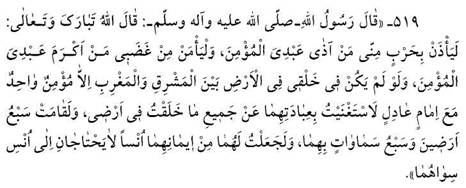 *
*
519.
“Quoting God, the Holy Prophet (SAW) has said: Whoever hurts My
believing servant has declared war against Me and whoever honors My believing
servant, he is certainly safe fro My wrath.
Among all the creatures I have in the east and the west, if there is a
single believer who is with an Imam and a just leader with their servitude, I
will independent of all creatures that I have on the earth, for the seven earths
and seven heavens depend on those two.
I will create a kind of fondness between them out of their belief that,
they will not need the fondness of others.”
o-
Raising two hands during Dua
*  *
*
520.
“Raise the palm of your hands humbly before Me as a slave who cries out
and seeks help from his master.
Should you do so, you will be entitled to My Mercy, for I am the Most
Generous and the Most Powerful.
O Moses! Seek My Grace and Mercy, for these two are only in My hands and
others do not have them.
Whenever you ask something from Me, see how willing you are to what is
with Me. Every
one will receive reward according to his deed and many an ungrateful man too
will receive reward for his endeavor.”
*  *
*
521.
“It has five characteristics:
1-
To seek refuge with God, you should put the palm of both hands towards
Qiblah.
2-
To have your sustenance increased, open your hands and put the palm of
both hands towards the sky.
3-
To give up hope in anyone but God, point with the index finger.
4-
To supplicate, raise your hands above your head.
5-
To supplicate move your index finger against your face, for it is the Dua
of fear.”
Muhammad
Ibne Moslem has reported on the authority of Imam Sadeq (AS):
*  *
*
522.
“While I had raised my left hand in my prayer a man passed by me and
said: O servant of God! Recite Dua with your right hand raised.
I said: O servant of God! God has the same right on this hand as He has
on the other.”
*  *
*
523.
“Inclination is when you expose both hands to reveal what is inside.
Fear is when you open both hands to reveal their backs.
Supplication is when you move the index finger of the right hand to the
right and the left.
Giving up hope in anyone but God is when you gently raise and lower the
index finger of the left hand.
Weeping
is when you open both hands and forearms towards the sky.”
Sadeeq
Ibne Yassar has reported on the authority of Imam Sadeq (AS):
*  *
*
524.
“Inclination is as such: The Imam had exposed the palm of his hands to
sky. Feara
is as such: The Imam had put the back of his hands towards the sky.
Supplication
is as such: The Imam was moving his fingers to right left.
Weeping state is as such: The Imam was taking his fingers up and down.
Weeping state is such: Drawing his hand against his face, the Imam said:
Weeping state is not actualized unless you see tears.”
* ![]() *
*
525.
“Humility to Dua is to put both hands on shoulders.”
In
Inclination when the palm of hands are exposed to sky, man hopes to have his
desires fulfilled.
Hence he is opening his hands to receive God’s beneficence.
In Fear when the back of hands are exposed to sky, man wishes to say to
God who is Aware of all the secrets of the world with a language of humility: O
God! I dare not open my hands before you, rather I have put it towards the earth
out of shame and humility.
In supplication in which man moves his fingers to right and left, perhaps
man wishes to pose himself as a bereaved person who, in afflictions, moves his
hands to right and left while reciting elegy.
In weeping state, in which he brings his fingers up and down, man wishes
to tell God: I have given up having hope in any one but You.
As for putting his hands on the shoulder, it is like a criminal person
who is taken to his master while his carnal desires have tied him up but his
heart says: O God! I have put fetters on my hands for doing injustice to You.
Note
|
Acts
to Follow Dua |
a-
To recite Dua Frequently whether it is answered or not
-In
case it is answered:
Abandoning
Dua in this state is unjust.
Rather, we should keep on praising God for answering our Dua.
God blames those who act against this verse 8 of the Quranic Chapter,
Zumar:
*  *
*
“And
when distress afflicts a man he calls upon his Lord, turning to Him frequently;
then when He makes him possess a favor from Him, he forgets that for which he
called upon Him before.”
And
verse 12 of the Quranic Chapter Yunus:
*  *
*
“And
when affliction touches a man, he calls on Us, whether lying on his side or
sitting or standing; but when We remove his affliction from him, he passes on as
though he had never called on Us on account of an affliction that touched him;
thus that which they do is made fair-seeming to the extravagant.”
*  *
*
526.
“A believer should recite Dua in the time of case and comfort as in the
time of hardships.
A believer should neither become infirm nor tired of Dua when his desire
has been fulfilled, for Dua has a dignity with God.”
-In
case the Dua is not answered:
*  *
*
527.
“O Ahmad! Keep away from Satan.
Do not ever allow him to find a way to you making you disappointed, for
Imam Baqer (AS) has said:
A
believer may have a desire but its fulfillment might be delayed, for God loves
his supplication.
Then the Imam said: By God! Delay by God in what believers desire in this
world is better than its hasty fulfillment.”
* 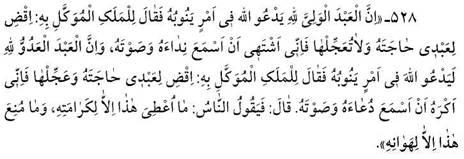 *
*
528.
“A man who loves God recites Dua in affliction too and God will say to
an angel appointed for it: Fulfill the desire of My servant but do not make
haste, for I love to hear his voice.
But when a man who is the enemy of God recites Dua in affliction man
quickly, for I do not love to hear his voice.
The Imam said: But people say: This man whose desire has been granted is
certainly honorable with God and the one whose desire has not been granted is an
abject person.”
*  *
*
529.
“A believer is always on the path of good and hopes in God’s Mercy as
long as he does not make haste in having his desire fulfilled as a result of
which he is disappointed and abandons Dua.
The narrator says: I said: What is meant by making hasten?
The Imam said: When he says I have been calling upon God for a long time
but my desire has not been fulfilled.”
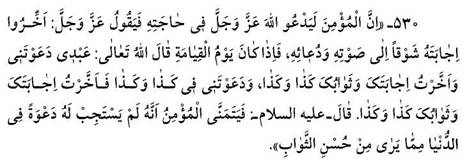 *
*
530.
“The believer calls upon God for his desire and God will say: Let there
be a delay in the fulfillment of his desire, for I love his voice and Dua.
On the Day of Judgment He will say: My servant! You called upon Me but I
made a delay in fulfilling your desire.
Your reward is such and such.
You called upon Me on such and such affair too and I made a delay in
fulfilling your desire too your reward is such and such.
Then the Imam said: By observing the great divine reward, the believer
wishes non of his desires in world has been fulfilled.”
*  *
*
531.
“The Messenger of God said: May God bless a servant of His who desires
something and insist on it whether it is fulfilled or not.”
Then
the Imam recited verse 48 of the Quranic Chapter, Marium as follows:
* ![]() *
*
“.....and
I will call upon my Lord; may be I shall not remain unblessed in calling upon my
Lord.”
* ![]() *
*
“God
loves one who calls on Him persistently.”
Kabolahbar
says in the Torah, it has been pointed out:
* 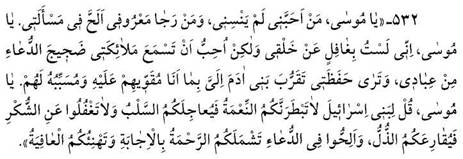 *
*
532.
“O Moses! Whoever loves Me, will not forget Me and whoever hopes in My
virtues, persists in his invocation.
O Moses! I am not ignorant of My creatures but I love My angels to hear
the supplication of My servants and My attendants to see how the children of
Adam seek nearness to Me for the things the means and power of which are in My
hand. O
Moses! Say to Bani Israel, do not ever let blessings push you to rebellion, for
in that case, they will be taken from you will fall into abjectness.
Persist in Dua so that with My positive response you will be entitled to
My Mercy and enjoy prosperity.”
* ![]() *
*
-”By
God! No believer has ever persisted in expressing his needs which God has not
fulfilled.”
*  *
*
533.
“I said to Imam Sadeq (AS): Can a person recite Dua and his Dua is
answered but there is a delay in it for sometime?
The Imam said: Yes.
I said: Why?
Does he have to recite more Dua?
The Imam said: Yes.”
*  *
*
534.
“I said to Imam Sadeq (AS): Can the Dua recited by a person be
fulfilled but with a delay?
The Imam said: Yes, even as long as twenty years.”
Hesham
Ibne Saalem has reported on the authority of Imam Sadeq (AS):
*  *
*
535.
“From the time God said to Moses and Haroon: “Your call was
answered” to the descent of torment on Pharaoh it was forty years.”
Abi
Baseer has reported on the authority of Imam Sadeq (AS):
* ![]() *
*
536.
“The believer recites Dua but its fulfillment is delayed till Friday.”
*  *
*
537.
“A servant of God says: O God! Forgive me.
But God turns away from him.
Again he will say: O God! Forgive me.
God turns away from him for the second time.
The man says again: O God! Forgive me.
Here God says to the angels: Don’t you see My servant?
He asked Me for forgiveness while I was turning away from him.
He asked for forgiveness for the second time.
I turned away from him again.
He asked for forgiveness for the third time.
My servant realized that no one but Me forgives the sins.
I take you as witness that I have forgive him.”
* ![]() *
*
538.
“God loves mostly those of His servant who often recite Dua.”
* ![]() *
*
“Amiralmomenin
was a man engaged in Dua most of the time.”
*  *
*
“Shall
I introduce to you a weapon which will both keep you safe from the evils of your
enemies and have your sustenance increased?
They said: Yes, O
Messenger of Allah! The Holy Prophet said: Call upon your Lord day and
night with Dua, for Dua is the weapon of the believer.”
O
follower of truth! Let it be known to you that there are four enemies against
you: Carnal desire, the world, Satan and concupiscence which have been mentioned
in the Dua of the Infallibles as follow:
 *
*
539 “O God! Help me, assist me, against the carnal
desire dominating me, against the world which has adorned itself for me, and
against the concupiscence which calls me to vices all the time unless You have
Mercy on me.”
*  *
*
540. “There
is a Satan sitting on every heart but when God is remembered, Satan will leave
the heart and disappear.
If God’s remembrance is abandoned, man as a morsel is devoured and
absorbed by Satan.
As the result, Satan will deceive him and make him to err and rebel.”
* ![]() *
*
541. “Good
deed is a matter of habit.”
* ![]() *
*
542. “Since
they have private meeting with God and God too illuminates them with His
light.”
* 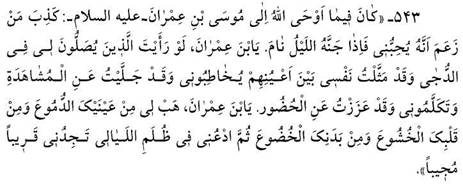 *
*
543. “One
of the revelations made to Moses was this: One who believes he loves Me but goes
to sleep when night comes must be lying.
O Son of Imran! How good it was if you could see those rising for prayer
in darkness. While
I am showing them My image.
Though My position is the Most High, they address Me as if I am in their
presence. O
son of Imran! Give me tears of your eyes, humility of your heart, and modesty of
your body. Then
call on Me in the darkness of night to find Me as One who answers soon.”
*  *
*
544. “A
servant of God rises up at night for prayer but slumber takes him over from
right and left so much so that his chin falls on his chest.
At this time, God orders the gates of heaven to be opened saying to
angels: Look at My servant and see what sufferings he has for what I have not
made obligatory to him?
He has three desires: To forgive his sins, to renew his repentance, and
to increase his sustenance.
O My angels! Be witness that I have granted the three desires.”
*  *
*
545. “O
Moafazzel! God has servants who trade with Him with devotion.
He too trades with them what His purest virtues.
They are the persons whose book of deeds is clean on the Day of Judgment
and when they stand before God, they fill those books with the secrets they had
with Him. Mofazzel
says: I said: O my master! Why is it so? The Imam said: God considers them too
great to disclose the secrets between Him and them to the angels.”
* ![]() *
*
“Allah is well pleased with them and they are well pleased with
Allah.”
* ![]() *
*
“....and best of all is Allah’s goodly pleasure that is the grand
achievement.”
*  *
*
546. “My
truthful servants! Enjoy the blessing of worship Me in this world, for it is the
same blessing you will enjoy in paradise.”
*  *
*
547. “Sitting
in a congregation mosque to me is better than sitting in paradise, for when I am
sitting in paradise I am well pleased but when I sit in mosque, my Lord is well
pleased.”
*  *
*
548. “whoever
becomes fond of God, is estranged from people.
The sign of being fond of Him is to fear people.”
When among us, he was one of us and when he received us, he was very
close to us and when we asked something from him, he would fulfill our desire.
Although he was very sincere, and we felt that sincerity, we did not dare
to speak in front of him due to his awe nor did we dare to raise our look
towards him due to his dignity.
When smiling, it was such that only his front teeth which were like
pearls showed themselves.
He honored the faithful ones and loved the destitutes.
Neither the powerful ones could allure him into injustice nor the
oppressed were desperate about his justice.
I take God as witness that I saw him in the altar lamenting and weeping
in the middle of the night when darkness had spread everywhere and stars were
hidden, crying out:
*  *
*
549. “O
world, o world, are you offering yourself to a person like me or expressing
love to me? How
far! Time is not proper for you.
Deceive anyone but me.
I do not need you, for I have divorced you three times, an irrevocable
divorce. Your
life is short, your position worthless and setting hope on you is the same as
abjectness.
b- To
draw hands on the face
Ibne Ghaddah has reported on the authority of Imam Sadeq (AS):
*  *
*
550. “No
man raised his hand towards God unless God is ashamed of returning it empty.
Therefore, anyone of you who recites Dua should not pull it back without
drawing it on his face.”
*  *
*
551. “No
man extends his hand towards God unless God is ashamed of returning it empty and
puts some of His bounty and mercy -that amount which He wills -in it.
Therefore, when one of you recite Dua do not pull back your hand without
having drawn it on your face.”
* ![]() *
*
552.
“The hand of no seeker returned empty of Your bounty and grace.”
c-
In this connection, Imam Sadeq (AS) has said:
*  *
*
“Whoever has desire should first recite Salawaat, then recite Dua for the
fulfillment of his desire and finally end the Dua with Salawaat, for God is too
Generous to fulfill two sides of Dua and abandons its middle since Salwaat is
accepted by Him.”
d-
*  *
*
553. “Whenever
a person recites Dua and then says: Whatever God wills, for there is no power
but through God, the Most High, the Great, God will say: My servant has given up
hope in people and has submitted to My order.
Fulfill his desire.”
*  *
*
554.
“Whoever wishes to have his desire fulfilled, should say after the Dua:
Whatever God wills for, we will be submissive to it; whatever God wills, we will
give earnest heed; whatever God wills will come to pass, for there is no might
or strength save with God, the Exalted, the Great.”
e-
Sins committed after Dua on many occasions hold back Dua.
In the Dua recited by the Infallibles (AS) we read:
*  *
*
555. “I
seek refuge to You from the sins which rejected supplication and I seek to You
from the sins which hold back the oath.”
*  *
*
556. “Avoid
sins, for they will undo good deeds.
Man commits sins as a result of which he will be hindered from midnight
prayer. Man
commits sin as a result of which he is deprived of the sustenance he can be
easily given. Then,
the Holy Prophet (SAW) recited verse 17 through 20 of the Quranic Chapter, the
Qalam as follows: “Surely We will try them as We tried the owners of the
garden, when they swore that would certainly cut off the produce in the morning.
And were not willing to set aside a portion for the poor.
Then there encompassed it a visitation from your Lord while they were
sleeping. So
it became as black, barren land.......”
*  *
*
557. “O
son of Adam! You invoke Me to give you what I know will benefit you and insist
on it too. I
too give it to you but you make use of it in committing sin.
I too tear the veil and expose your sin.
You recite Dua and I cover up your sins.
How fairly I treat you and how unfairly you treat Me! Soon I will be so
wrathful to you that I will never be pleased with you again.”
*  *
*
558.
“Do not ever allow to deceive you one who rebels against Me with sin
and rebellion and enjoys the sustenance I give him but he is the servant of
others. Nevertheless
whenever he calls upon Me in hardships, I will fulfill his desire.
Yet he returns to his former rebelling against Me or provoking My wrath?
By Myself! I will take him in such a way that there will be no escape for
him and he will have no shelter but Me.
Where will he escape?
From My earth and heavens?”
*  *
*
559.
“A man asks his worldly desire from God and He too, due to His
grandeur, fulfills that desire soon or late but that man commits sin afterward.
Here God says to the angel appointed to fulfill that desire: Do not
fulfill his desire, for he has provoked My wrath and should be deprived of My
favor.”
|
Consequences
of Sins |
The
Infallibles (AS) in their Duas seek refuge with God from sins yet their
interpretation have been mentioned in a Hadith by Imam Zeinol Abedeen as such:
*  *
*
560.
“Those sins which alter blessings such as oppressing people, abandoning
good deeds as a habit and ingratitude of blessing.
In this connection, in verse 11 of the Quranic Chapter, Rad, we read:
* ![]() *
*
“......Allah
does not change the condition of a people until they change their own
condition.”
*  *
*
“Those
sins which leave regret behind are: To kill someone illegally.
About Cain who killed his brother and did not know what to do with his
brother’s dead body, God says: “So he became of those who regret.”
*  *
*
“Also
to abandon ties of kinship when he is capable of observing it, to delay
performing his prayer, to abandon what has been recommended, not to help the
oppressed, not to give alms till the coming of his death and his becoming
tongue-tied.”
*  *
*
“And
those sins which destroy blessings are: Sins committed by a man who knows God,
rebellion against people, and ridiculing them.”
*  *
*
“Those
sins which repels man’s enjoyment of God’s blessings are: To express one’s
destitution, so sleep at the time of morning and night prayer, to underestimate
God’s blessings and to complain of God.”
 *
*
“Those
sins which tears the veil of innocence are: To drink wine, to gamble, to do
something to make people laugh, idle talk, to joke, to find faults with people,
and to associate with those whose ideas and deeds are dubious.”
*  *
*
“Those
sins which draw down tribulations are: Not to help someone who asks for help,
not to help the wronged one, to misuse enjoining the good and forbidding the
bad.”
 *
*
-
“Those sins which make the enemy victorious are: To oppress people openly, to
commit sin openly, to consider something unlawful as lawful, to rebel against
the righteous, and to obey the wicked.”
 *
*
-
“Those sins which hasten death are: To abandon love of kinship,
to take false oath, to tell lie, to fornicate, to obstruct good deeds,
to claim leadership unjustly.”
 *
*
-
“Those sins which cause despair are: To despair of God’s Grace, to get
disappointed of God’s Mercy, to rely on others instead of God, and to consider
God’s promise as false.”
 *
*
-
“Those sins which make the sky dark are: Sorcery, fortune telling to believe
in the effects of stars on man’s fate, to consider God’s will as false, and
to be disowned by one’s parents.”
*  *
*
-
“Those sins which tear the veil (cause disgrace) are; To borrow but not to pay
it back, to be extravagant, to be stingy in meeting the needs of the family, to
be bad-tempered, to be impatient, to be lazy, and to contempt religious
people.”
*  *
*
-
“Those sins which reverts Dua are: To have bad intention, to be evil in heart,
to be hypocrite towards brothers in faith, not to confirm brothers in faith by
abandoning a positive response, and to delay the obligatory prayers.”
------
|
Mubahila
(Mutual Cursing) |
There
are two questions in the connection:
Firstly-
It should take place at the time related in Hadith.
Abu
Hamza Thamalee has reported on the authority of Imam Baqer (AS):
* ![]() *
*
561. “The
time of Mubahila is between dawn and the sunrise.”
Secondly-
How to do it: Muhammad Ibne Abi Amir has reported on the authority of
Mohammad Ibne Hakim and Abi Massroogh: I said to Imam Sadeq (AS): When
discussing your leadership (Imamat) with your opponents, we recite verse 59 of
the Quranic Chapter, Nessa:
* ![]() *
*
- “O you who believe! Obey Allah and obey the Apostle and those in
authority from among you.”
* ![]() *
*
“Only Allah is your Vali and His Apostle and those who believe, those
who keep up prayers.”
* ![]() *
*
“Say:
I do not ask of you any reward for it but love for my near relatives.” they
say: This verse is about those near to muslims not those close to the Holy
Prophet.
Abu
Massroogh says: I mentioned every reason which I had in mind but the Imam said:
* ![]() *
*
562.
“Whenever such a thing happens, invite them to Mubahila.”
*  *
*
“Purify yourself for three days.
I think he said: Keep fast, take bath (religious Ghusl), go to open
space, then put the fingers
of your right hand on the fingers of his hand.
Starting with yourself, say:
*  *
*
“O
God who are the Lord of seven heavens and seven earths, O God who know both seen
and unseen! O the Most Compassionate, the Most Merciful! If Abu Massroogh denies
the truth and advocates an unjust statement, send down a tribulation or painful
chastisement on him from heaven.”
* ![]() *
*
“Then revert the Dua to him and say:
*  *
*
“If
such a person denies the truth and advocates something false, send down a
tribulation or painful chastisement on him from heavens.”
* ![]() *
*
“If
you do so, a torment will soon come down on him.
By God, I have not found anyone to give positive response to my
invitation to Mubahila.”
Conclusion
|
Hypocrisy |
The
meaning of hypocrisy which is the same as hidden polytheism is that a man does
what seems to be obedience to God but the aim is not to seek nearness to God but
to create honor for him in the eyes of people in order to meet his demands.
In this connection, the Holy Prophet (SAW) has said:
* ![]() *
*
563.
“Whoever performs prayer in order to see by men has become a
polytheist.”
*  *
*
“Say
I am only a mortal like you, it is revealed to me that your god is one God,
therefore whoever hopes to meet his Lord, he should do good deeds, and not join
any one in the service of his Lord.”
*  *
*
564.
“I am the best partner and if anyone chooses a partner other than Me in
his deed, I will not accept it and transfer it to My partner, for I will only
accept those deeds which are devoted to Me.”
*  *
*
565.
“I am the Most rich partner. Therefore whoever does a deed and takes a
partner for Me in that deed I free Myself from obligation and transfer it to My
partner.”
*  *
*
566.
“Everything rightful has a truth in it and no man will reach the truth
of devotion unless he does not wish to be praise for what he has done for the
sake of God.”
1-
God and the fact that everything is in His hand.
2-
People and the fact that nothing is in their hand.
3-
Human
dignity, honor and endeavor.
It
is in this case that people will not be important to you.
The Holy Prophet (SAW) refers to the same matter when he says:
*  *
*
567.
“O Abazar! No one will ever become a jurisprudent that too, a supreme
one unless he will not fear people can change him.”
* ![]() *
*
“Then
he should look at himself and consider it as the most humble one.”
* 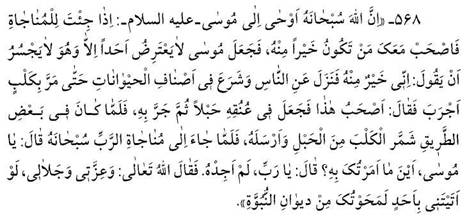 *
*
568.
“God inspired Moses (AS): whenever you come to Me supplicating, bring
with you one from whom you are better.
Moses (AS) did not dare to say he was better than others.
Therefore he stopped finding such a person among human beings and began
to search among animals till he came across a mangy dog.
He said to himself: I will take it with me.
He put a rope round its neck and pulled it behind him.
On the way he untied the rope and set the dog free.
When Moses (AS) reached the supplication site, God said to him: O Moses!
Where is man We had ordered you to bring?
Moses (AS) said: O God! I could not find it.
God said: By My glory, even if you had brought one person, I would have
erased your name from the book of prophets.”
Hypocrisy
may occur in the following cases:
1-
when a person does something mainly to be seen by men and there is no Godly
motivation I his deed.
This kind of hypocrisy must be abandoned, for it is a sin and is not
considered as obedience to God.
About this, the Holy Prophet (SAW) has said:
* ![]() *
*
569.
“Hypocrisy is a hidden polytheism.”
2-
3-
When a person has devotion in his heart but in the middle of the way
hypocrisy afflicts him, here he should keep on repelling it and should not
abandon Dua.
Hence
once who recites Dua in secret is among those who are unknown among people but
known in heavens as described by the Holy Prophet (SAW):
* ![]() *
*
570.
“The most believed servants of God are the most pious ones who worship
God in secret, those who, if their names are mentioned, no one knows them.”
* ![]() *
*
571.
“A wise man is one who neither does anything good out of hypocrisy nor
abandons it due to modesty.”
* ![]() *
*
“It
is incumbent on you to hide your deed and Dua but I have to make it manifest.”
* ![]() *
*
“No
man ever attains true devotion unless he does not love to be praised for a deed
done for God.”
*  *
*
“Say:
I am only a mortal like you; it is revealed to me that your god is one God,
therefore whoever hopes to meet his Lord, he should do good deeds, and not join
any one in the service of his Lord.”
1-
A person’s aim is to hide his devotion but when people know about his
deeds and devotion he understands that it is God who has made them known so as
people to honor His servant and to do him a favor, for it is one of God’s
attributes as mentioned in the following Hadith:
* ![]() *
*
“O
You who reveal what is beautiful and conceal what is ugly.”
* ![]() *
*
* ![]() *
*
“Say:
In the grace of Allah and in His mercy -in that they should rejoice; it is
better than that which they gather.” (Verse 58 of the Quranic Chapter,
Yunus.)
2-
From revelation of what is beautiful and concealment of what is ugly, he
will conclude that God will treat him in the same manner in the Hereafter too,
for the Holy Prophet (SAW) has said:
* ![]() *
*
573.
“God does not cover up anything for His servant which He does not cover
up in the Hereafter.”
3-
As
for blameworthy happiness: If a person’s happiness is due to his having a
position with people so that he will be praised, his needs to be met, and to be
honored by all, then this kind of happiness is sheer hypocrisy and not only
ruins the good deeds but turn them into bad ones and will take him down to hell
instead of paradise.
The
Root of and Motivation behind Hypocrisy
* ![]() *
*
574.
“God forgives temptations which are in the heart of my Ummah as long as
they do not speak of it or do it.”
How
to cure hypocrisy
Devotion
is attained when appearance and heart become identical.
A person was told: Do everything openly.
He said: How? they said to him: Do everything in a way that if people
know it, you are not ashamed of it.”
In
this connection, Imam Ali (AS) has said:
*  *
*
575.
“Never do anything for which you have to apologize, for good deeds
require no apology.
Do not do in secret anything which if made open, you are ashamed of it.
Also avoid deeds which if reminded, its doer denies it.”
*  *
*
576.
“The highest degree of faith is one which if a person attains, becomes
successful and is delivered, that is, his secret deeds should be so worthy that
he will not have fear when made public nor is afraid of their consequences in
case they are in secret.”
* ![]() *
*
577.
“Man should not do any deed the appearance of which is obedience to God
but is meant to please people.”
* ![]() *
*
578.
“God does not accept a deed in which there is an atom of hypocrisy.”
1-
One who was slain in the way of God
2-
One who gave away his wealth in the way of God
3-
One who recited the Holy Quranic (but his deeds were not for God)
The
Holy Prophet (SAW) has said:
*  *
*
579.
“God says to these three people: You are lying, for you wished they
would say he was “generous”, he was “brave” and “reciter” of the
Holy Quran.”
* ![]() *
*
580.
“The most horrible thing I fear about you is minor blasphemy.”
*  *
*
“It
is hypocrisy, for on the Day of Judgment when God gives His servants rewards for
their deeds, will say: Go to those for the sake of whom you acted hypocritically
in the world. Will
they give any reward for your deeds?”
* 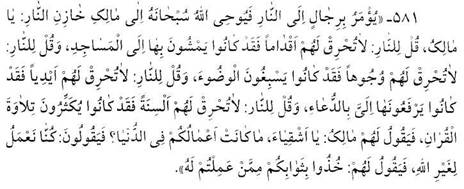 *
*
581.
“On the Day of Judgment, there is an order to take some people toward
Fire. God
will say to the master of Fire: O master! Say to the Fire: Do not burn their
feet for they used to go to mosque with those feet.
Say to the Fire: Do not burn their face, for they use to perform
ablution. Say
to the Fire: Do not burn their hands for they raised them towards Me for Dua.
Say to the Fire: Do not burn their tongue, for they used to recite the
Holy Quran. Here,
the master of the Fire will say to them: O miserable ones! What were you doing
in the world? they
say: We were doing for others and not God.
The master of the Fire will say: Receive your rewards from those for whom
you did your deeds.”
582.
A man of Bani Israel (Israelite) said to himself: I should perform my
prayer in a manner that I will become famous among people.
Sometime passed and he did perform a lot of prayer but as soon as he
appeared before people, they said: He is dissimulating, he is hypocrite.”
* ![]() *
*
583.
“Whoever seeks God’s praise instead of people’s praise, God Himself
will protect him against people and fulfill his desires.”
*  *
*
584.
“Whoever rectifies his Hereafter affairs, God will rectify his worldly
affairs and whoever rectifies what is between him and God, God will rectify what
is between him and people.”
* ![]() *
*
“And
Allah shall deliver those who guard (against evil) with their
achievement” we read:
*  *
*
585.
“In the fear and horror of the Day of Judgment, a righteous deed will
say to its doer, mount me for I was mounting you in the world for a long time.
Here the doer of a righteous deed mounts it and the righteous deed too
takes him through the hardships of the Day of Judgment.”
Dawood
Ibne Farghad has reported on the authority of Imam Sadeq (AS):
*  *
*
586.
“A righteous deed paves the way for its doer in the same way that a man
sends his servant ahead of himself to prepare everything for him.”
* ![]() *
*
“....and
whoever does good, they prepared (good) for their own souls.”
* ![]() *
*
587.
“Whoever devotes himself solely to God for forty days, fountains of
wisdom shall pour forth from his heart upon his tongue.”
Obeid
Ibne Zarareh has reported on the authority of Imam Sadeq (AS):
*  *
*
588.
“There is no believer unless God has made out of his faith a kind of
friendship and company by which he will keep calm in a way that even if he is on
the peak of a mountain, he will not have any fear.”
Halabi
has reported on the authority of Imam Sadeq (AS):
* ![]() *
*
589.
“Associate with people so as to test them and when you have tested
them, you will find out that they are not your friends.”
* ![]() *
*
590.
“The more you understand people, the more you will fear them.”
*  *
*
591.
“Should you wish to meet Me in paradise on the Day of Judgment, you
must be stranger, lonely, melancholic, fear-stricken as a lonely bird flying
over emply lands and eating fruits from the top of trees and when night falls,
takes abode in its nest, for this bird is familiar only with Me and fears
people.”
*  *
*
592.
“Whoever sends up his devoted prayer, God will send him His best
means.”
*  *
*
593.
“A man will never become a truly devoted servant of God unless he gives
up hope in any one but God.
In this case, God will say: This devotion is only for Me, hence, He will
accept it due to His generosity and kindness.”
*  *
*
594.
“God has not given His servant a greater blessing than when there is no
one but God in his heart.”
*  *
*
595.
“O Hesham! Forbearing loneliness is a sign of wisdom.
Whoever appreciated divine knowledge, he will keep aloof from the worldly
people and tends towards what is with God.
In fear, such a person is familiar with God and in loneliness, God is his
company and in destitution, God will make him rich and will make him mighty in
helplessness. O
Hesham! A little action with knowledge is acceptable whereas a lot of actions
with ignorance is rejected.”
* ![]() *
*
596.
“The best prayer is devotion.”
*  *
*
597.
“If all people go to one side, I will go towards person who is only the
servant of God out of devotion.”
*  *
*
598.
“If the whole world turns into a morsel and I will give that morsel to
a devoted servant of God, I have neglected his right and if I stop an unbeliever
from dying hungry and thirsty and then give him a drop of water I have been
extravagant.”
Make
yourself accustomed to keeping your prayer secret and perform it behind the
closed the doors.
Prophet
Jesus (AS) said to disciples:
*  *
*
599.
“When you go without food, put oil on your head and olive oil on your
lips so people will not know you go without food.
When your give money, let not your right hand see what your left hand
does. When
you make your prayer, go into your private room and shut the door, for the same
God who divides sustenance, divides praise.”
*  *
*
600.
“On a day when there is no shade but His, God will put three groups
under the shade of His Throne: Two persons who make friend for the consent of
God and are separated for the same purpose.
A person who gives money with his right hand while hiding it from his
left hand and a man whom a beautiful woman calls to herself but he will say to
her: I fear God, the Lord of the two worlds.”
Hafas
Ibne Bakhtari has reported on the authority of Imam Sadeq (AS):
*  *
*
601.
“My father has narrated from Amiralmomenin (AS) as saying to Kumeil
Ibne Ziad Nakhaee: Give away but remain unknown.
Hide your good deeds so they are not remembered.
Learn knowledge and practice what you have learnt.
Keep quiet so as to remain sound.
Make the good people happy and the wrongdoers angry.
When God made His religion known to you, it is immaterial whether people
are not known to you or you are not known to them.”
It
has been reported on the authority of the Infallibles:
* ![]() *
*
602.
“A good deed done in secret is seventy times better than one which is
done openly.”
*  *
*
603.
“Whoever does a good deed in secret, it is recorded in the book of his
deeds as a secret deed.
If he speaks about it to others, the word “secret” is erased and is
recorded as open deed.
If he speaks about it for the second time, it is erased and hypocrisy is
recorded instead.”
|
Self-Admiration |
Self-admiration
will ruin man as the Holy Prophet (SAW) has said:
*  *
*
604.
“Three things ruin human beings: The stinginess which is obeyed, the
desire which is followed and man’s self-admiration which will ruin good deeds
and incure God’s wrath.”
*  *
*
605.
“Were a believer’s wrongdoing not better than his self-admiration,
God would never make him free in committing wrongdoing.”
* ![]() *
*
606.
“An act of disobedience making you worried is better than a good deed
which makes you proud.”
* ![]() *
*
607.
“Nothing is better than humbleness and no loneliness is more horrible
than self-admiration.”
*  *
*
608.
“God sent a revelation to prophet David saying: O Dawood! Give good
tidings to wrongdoers and admonish the pious.
David said: How shall I give good tidings to the wrongdoers and admonish
the pious? God
said: Give good tidings to the wrongdoers that I will accept repentance and
forgive their sins but admonish the pious lest they will become proud of their
deeds for never were a man proud of his good deeds unless he was ruined.”
* ![]() *
*
“Never
did a man make an end account of his good deeds unless he was obliterated.”
* 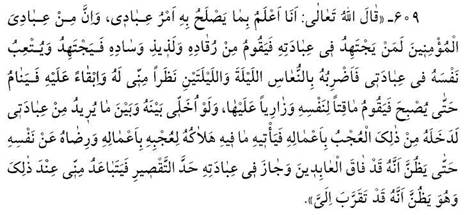 *
*
609.
“I know the interests of My servants better than themselves, for
sometimes one of My believing servants does his best to perform his prayer, he
wakes up from his pleasant sleep over him for a couple of nights.
This is due to My favor with him so as to make him steadfast.
Hence, he keeps on sleeping and when he wakes up, he will get angry with
himself. If
I leave him free in performing prayer, he would be overwhelmed by
self-admiration which would ruin him, for he would feel superior to servants and
had the impression that he had not failed in worshipping Me.
To sum it up he would keep aloof from Me whereas in his opinion, he was
near to Me.”
*  *
*
610.
“God says: Some of My believing servants invoke the grace of some
prayers but I take away the grace of the deed lest they will become proud of
it.”
*  *
*
611.
“O assembly of disciples! There are many lamps which are extinguished
by winds and many pious me who are obliterated by self-admiration.”
What
is self-admiration?
Self-admiration
is when man overestimates his good deeds and is happy with them.
Saad
Ibne Abi Khalaf has reported on the authority of Imam Sadeq (AS):
*  *
*
612.
“Do your best all the time and think of your shortcomings, for you can
not worship God as He really deserves.”
* ![]() *
*
613.
“One who is made happy by a good deed and sad by a bad deed is a true
believer.”
*  *
*
614.
“He does not belong to us one who does not call himself to account,
that is, if he has done a good deed he should praise God and wish for further
good deeds and if he has done something wrong he should ask for forgiveness.”
*  *
*
615.
“Let it be known to you O servant of God!
That
a believer never ends his day but reproaches himself and wishes for further good
deeds. Therefore,
be as those who lived and passed away before you.
As a traveler, pick up the pitch of tent of
the world and wrap it up so as to go through other stations.
Self-admiration
incurs God’s wrath and obliteration of good deeds.
One should note that all signs and body members by which we perform
prayer belong to God.
Are our sustenance and health not His?
Is our success in performing prayer not a blessing for which we should be
thankful to God? Hence we should fear failing to perform them and being taken to
task.
God
in a revelation to Prophet David (AS) has said:
*  *
*
616.
“O Dawood! Thank Me.
David said: O Lord! How can I thank you while thanks giving itself is one
of Your blessings which needs thanks?
He said: O Dawood! I am pleased to take this confession of yours as
thanksgiving.”
All
men receive wage or salary for the work they do but if we do a deed for the sake
of God, for instance, if we fast one day, God says:
* ![]() *
*
617.
“Fasting is for My sake and I Myself will give its reward.”
* ![]() *
*
“I
have prepared for My servants things no eyes have seen, no ears have heard and
no mind imagined.”
* ![]() *
*
“So
no soul knows what is hidden for them of that which will refresh the eyes; a
reward for what they did.”
*  *
*
“And
whoever does good, whether male or female and he is a believer, these shall
enter the garden in which they shall be given sustenance without measure.”
It
has been reported on the authority of the Holy Prophet (SAW):
* ![]() *
*
“Whoever
says Sobhanallah (glory be to God) God, will plant a tree for him in
paradise.”
* ![]() *
*
618.
“Whoever takes his “self’ as enemy instead of people, God will keep
him safe from the fright of the Day of Judgment.”
*  *
*
619.
“Anyone of you who during the night repents his wrongdoing and blames
his “self” is better for him than beginning the day while he is happy with
his deed.”
*  *
*
620.
“Praise is due to Allah who judges among people on whatever he wishes.
Then he said: O Ma-aaz! I said: Yes, O Messenger of Allah and Master of
the believers.”
* ![]() *
*
“O
Ma-aaz! I said: Yes O Messenger of Allah! O leader of the good and prophet of
mercy!”
*  *
*
“I
will give you a piece of news no prophet has given to his nation.
If you memorize it, it will benefit you in your life and if you hear but
do not memorize it, you will not have any excuse before God.”
* 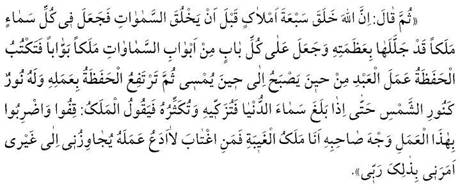 *
*
“Then
he said: Before creation of heavens, God created seven angels appointing each of
them in a heaven and made that heaven splendid with that glory.
Then God appointed an angel as gate keeper to each of the gates of
heavens.
The
guardian angels record man’s deeds day and night and send them up while it is
as bright as the sun.
When they reach the sky of the world, they purify the deed and add to it
but out of sudden the angel will say: Wait! Throw this deed to the face of its
doer. I
am the angel recording the act of backbiting.
I will not let the deed of a backbiter pass on to a heaven.
This is the order of My Lord.”
*  *
*
“He
said: Then the next day while carrying good deeds the angels return and pass by
the former angel, purify the deed and add to it till they reach the second
heaven where the angel of that heaven will say: Stop here.
Throw this deed to the face of its doer, for with this deed, he was
following mean objectives in world.
I am the angel of worldly affairs and will not let the deed of this
person pass on to others from here.”
*  *
*
“He
said, The next stage angels, take up the deed of God’s servant from whose
charity and prayer they are happy.
But when they reach the third heaven, the angel will say: Throw this deed
to the face of its doer.
I am the angel recording arrogance.
This person had good deeds but was arrogant to people.
My Lord has ordered me to let his deed pass on to others from here.”
*  *
*
“Then
he said: The guardian angels took up the deed of God’s servant while it was
shining like a star and his voice was up with glorification of God, fast, and
Hajj pilgrimage.
They were taking it up to the fourth heaven when an angel said: Stop
here. Throw
it to the face and belly of its doer.
I am the angel recording self-admiration.
He was self-conceited.
He had good deeds but he was complacent.
My Lord has ordered to stop his deed to pass on to others from here.”
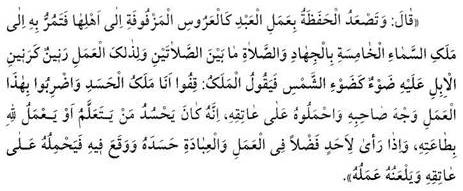 *
*
“Then
he said: The next stage, the guardian angels take up man’s deed which like a
bride is ready for wedding.
When they reach the fifth heaven, the good deed is accompanied by Jihad,
prayer and a sad voice like the moaning, of a camel and the light of the sun.
But the angel will say: Stop here! I am the angel recording jealousy.
Throw it to the face of its doer and put it on his shoulder.
He was jealous of seekers of knowledge and the obedient to God.
Whenever he saw someone was superior in devotion, he was jealous of him
and he started doing it.
Here that man’s deed is put on his shoulder while the deed curses
him.”
 *
*
* 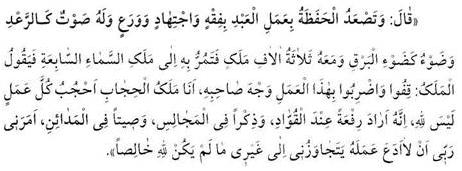 *
*
He
said: The guardian angels take up to heaven
man’s deed which is accompanied by understanding, endeavor and piety
while it has a sound like that of thunder and lightning.
In addition, three thousand angels will accompany it.
When they reach the angel in the seventh heaven he will say: Stop here.
Throw this deed to the face of its doer.
I am the angel in charge of veiling.
I will conceal from Him any deed which is not for His sake.
This person meant to obtain a high position with the chiefs and have
reputation. My
Lord has ordered me to stop him from passing on to others as long as his deed
has not been refined for God.”
* 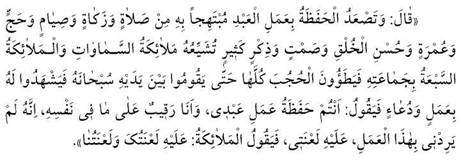 *
*
“Then
he said: This time, the guardian angels will take up man’s deeds for which man
is happy. Deeds
like prayer, alms, fast, Hajj, good temper, silence, and remembrance of God
which are accompanied by the heavenly angels as well as the seven angels reap
all the veils till they stand before God and they testify for him in practice
and with Dua. But
God will say: You are the guardians
of the deeds of My servants but I am the guardian of what passes in his
heart. He
did not mean Me with his deeds.
My curse be upon him.”
* ![]() *
*
“Follow
your prophet in being certain about the unity of God.”
* 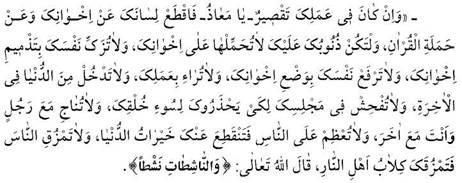 *
*
“O
Ma-aaz! If you have any shortcoming in your deed, stop talking about your
brother in faith and carriers of the Holy Quran.
Blame yourself for your wrongdoing not your brethren.
Do not ever justify yourself by reproaching your brothers in faith.
Do not overestimate yourself at the price of humiliating your brothers.
Do not dissimulate.
Let not your worldly desires interfere your affairs in the Hereafter.
Watch your language when associating with people so as people will not
keep aloof from you.
Do not whisper in an assembly.
Do not magnify yourself, for you will be deprived of the blessings.
Do not reproach people, for the dogs of Hell will reproach you.
God says: “By Nashetaat!”
* ![]() *
*
“Do
you know who “Nashetaat” are?
They are the dogs of Hell who bite flesh and bone.”
* ![]() *
*
“O
Ma-aaz! This will be easy to one for whom God has made it easy.”
The
reporter says: Ma-aaz did not recite the Holy Quran so much as he related this
Hadith.